Israeli Passport
Marife Adriano, A Project About the Philippine Foreign Workers in Israel
The project documents the fascinating story of Marife Adriano, who has been living in Israel as an illegal foreign worker for the past 14 years. Only recently has she received the status of a temporary resident. This status has enabled her, for the first time in years, to return for a visit to the Philippines and meet those she left behind. I accompanied her during her first correspondences with the Ministry of Interior, all through receiving her residency status as well as her visit to her homeland. Through Marife's story we get a unique glimpse to the world of Philippine immigrant workers in Israel. Her intriguing personal story embodies compassion, warmth, courage and leadership.
This body of photography allows us to see the people who live around us every day, caring for our parents, cleaning our houses. To us, they are transparent, invisible even. This photography project invites you to discover a hidden world that lies within each and every one of us.
This phenomenon of labor migration is a universal phenomenon, part of the globalization process which characterizes the modern world. During the first Intifada in the 1990's, the State of Israel began importing foreign workers from third world countries in order to fill the void in the labor market. Filipinos were the first foreign workers to come to Israel, a migration which has lasted to this day, and as a result the Philippine community is one of the largest and oldest within the foreign worker community. There are about 50,000 Philippine foreign workers in Israel, mostly women who come to work in nursing. Many of them stay in Israel beyond their authorized visas and have children, thus becoming illegal aliens.
In 1995 Marife, mother to 3 year old Kevin, had been working in the Philippines as a manual laborer in a textile factory. From this type of job, her monthly salary amounted to 50 dollars. This salary could not enable her to make a respectable living. In order to allow a better life for her family, she went to work in Israel, leaving her son behind with her parents.
In her early days in Israel she found jobs through an agency located on Allenby St. in Tel-Aviv. After several years, Marife decided to leave the agency and rented an apartment in South Tel-Aviv. She earned her living by cleaning houses and stairways.
Seven years ago, Marife gave birth to a son named Adwin, from an affair she had with a Filipino man who had also been working in Israel. That man returned to the Philippines shortly after his son was born, and since then there has been no contact with him. As an infant, Adwin stayed at a foreign worker day-care near the New Central Bus Station in Tel-Aviv. He'd spend each day at the day-care until 7 pm – when Marife finished her work. At age 6 he began studying at Bialik-Rogozin School in Tel-Aviv. At the same time, in order to acclimatize in Israel, Marife began learning Hebrew in an Evening Ulpan at that same school. Despite the difficulty of raising a child in a foreign country, she always made sure to send a large part of her salary to her family in the Philippines.
In 2005 the State of Israel decided to approve a one-time gesture of granting 900 foreign worker children a status of permanent residency. The criteria for receiving this status required that each child be born in Israel and had been living in Israel for over 6 years. This way, thanks to Adwin, Marife was given a certificate and in July 2008 both she and Adwin left the Ministry of Interior with Identity Cards as well as a permanent residency license which must be renewed every year.
Thanks to this new status, Marife could finally visit her family. On December 2008 she flew with Adwin to the Philippines. There, she met for the first time in 14 years, her 17 year old son Kevin – who now studies Electrical Engineering at the University. These studies were made possible by the money his mother had sent all those years. In addition, the family house had been renovated and their standard of living had improved.
These days Marife lives with Adwin in Tel-Aviv. Her dream is to become an equal citizen in the State of Israel. This photography project took place over a year and a half: from December 2007 to May 2009.
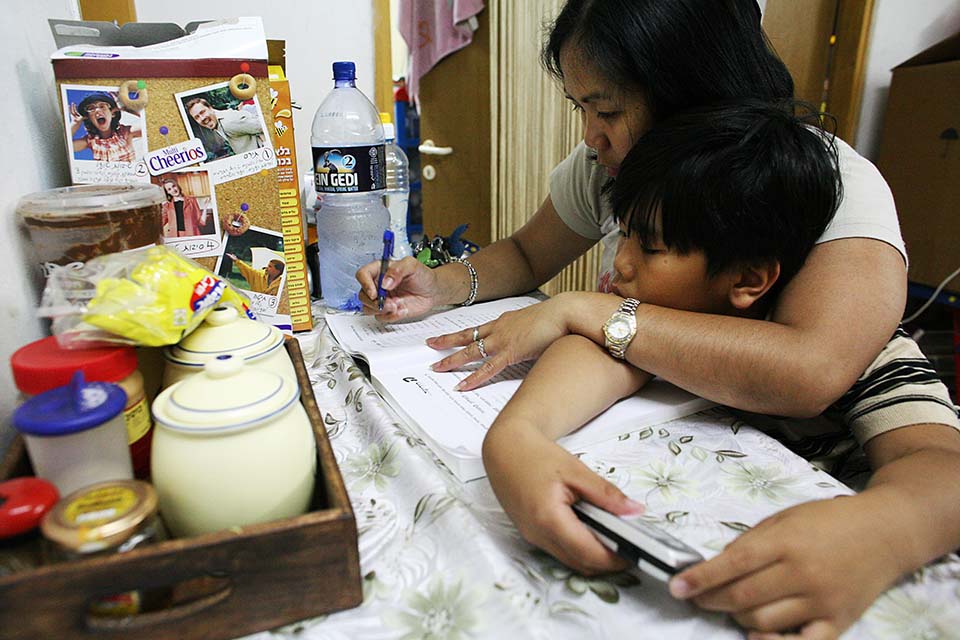 All contents © copyright Amos Roger. 2024 All rights reserved
All contents © copyright Amos Roger. 2024 All rights reservedIsraeli Passport
Marife Adriano, A Project About the Philippine Foreign Workers in Israel
The project documents the fascinating story of Marife Adriano, who has been living in Israel as an illegal foreign worker for the past 14 years. Only recently has she received the status of a temporary resident. This status has enabled her, for the first time in years, to return for a visit to the Philippines and meet those she left behind. I accompanied her during her first correspondences with the Ministry of Interior, all through receiving her residency status as well as her visit to her homeland. Through Marife's story we get a unique glimpse to the world of Philippine immigrant workers in Israel. Her intriguing personal story embodies compassion, warmth, courage and leadership.
This body of photography allows us to see the people who live around us every day, caring for our parents, cleaning our houses. To us, they are transparent, invisible even. This photography project invites you to discover a hidden world that lies within each and every one of us.
This phenomenon of labor migration is a universal phenomenon, part of the globalization process which characterizes the modern world. During the first Intifada in the 1990's, the State of Israel began importing foreign workers from third world countries in order to fill the void in the labor market. Filipinos were the first foreign workers to come to Israel, a migration which has lasted to this day, and as a result the Philippine community is one of the largest and oldest within the foreign worker community. There are about 50,000 Philippine foreign workers in Israel, mostly women who come to work in nursing. Many of them stay in Israel beyond their authorized visas and have children, thus becoming illegal aliens.
In 1995 Marife, mother to 3 year old Kevin, had been working in the Philippines as a manual laborer in a textile factory. From this type of job, her monthly salary amounted to 50 dollars. This salary could not enable her to make a respectable living. In order to allow a better life for her family, she went to work in Israel, leaving her son behind with her parents.
In her early days in Israel she found jobs through an agency located on Allenby St. in Tel-Aviv. After several years, Marife decided to leave the agency and rented an apartment in South Tel-Aviv. She earned her living by cleaning houses and stairways.
Seven years ago, Marife gave birth to a son named Adwin, from an affair she had with a Filipino man who had also been working in Israel. That man returned to the Philippines shortly after his son was born, and since then there has been no contact with him. As an infant, Adwin stayed at a foreign worker day-care near the New Central Bus Station in Tel-Aviv. He'd spend each day at the day-care until 7 pm – when Marife finished her work. At age 6 he began studying at Bialik-Rogozin School in Tel-Aviv. At the same time, in order to acclimatize in Israel, Marife began learning Hebrew in an Evening Ulpan at that same school. Despite the difficulty of raising a child in a foreign country, she always made sure to send a large part of her salary to her family in the Philippines.
In 2005 the State of Israel decided to approve a one-time gesture of granting 900 foreign worker children a status of permanent residency. The criteria for receiving this status required that each child be born in Israel and had been living in Israel for over 6 years. This way, thanks to Adwin, Marife was given a certificate and in July 2008 both she and Adwin left the Ministry of Interior with Identity Cards as well as a permanent residency license which must be renewed every year.
Thanks to this new status, Marife could finally visit her family. On December 2008 she flew with Adwin to the Philippines. There, she met for the first time in 14 years, her 17 year old son Kevin – who now studies Electrical Engineering at the University. These studies were made possible by the money his mother had sent all those years. In addition, the family house had been renovated and their standard of living had improved.
These days Marife lives with Adwin in Tel-Aviv. Her dream is to become an equal citizen in the State of Israel. This photography project took place over a year and a half: from December 2007 to May 2009.
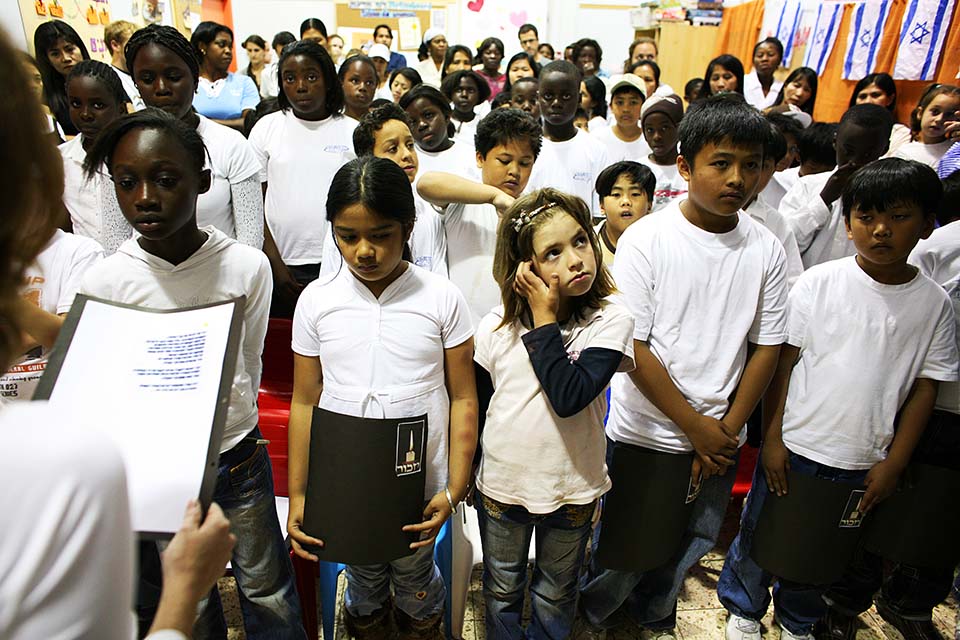 All contents © copyright Amos Roger. 2024 All rights reserved
All contents © copyright Amos Roger. 2024 All rights reservedIsraeli Passport
Marife Adriano, A Project About the Philippine Foreign Workers in Israel
The project documents the fascinating story of Marife Adriano, who has been living in Israel as an illegal foreign worker for the past 14 years. Only recently has she received the status of a temporary resident. This status has enabled her, for the first time in years, to return for a visit to the Philippines and meet those she left behind. I accompanied her during her first correspondences with the Ministry of Interior, all through receiving her residency status as well as her visit to her homeland. Through Marife's story we get a unique glimpse to the world of Philippine immigrant workers in Israel. Her intriguing personal story embodies compassion, warmth, courage and leadership.
This body of photography allows us to see the people who live around us every day, caring for our parents, cleaning our houses. To us, they are transparent, invisible even. This photography project invites you to discover a hidden world that lies within each and every one of us.
This phenomenon of labor migration is a universal phenomenon, part of the globalization process which characterizes the modern world. During the first Intifada in the 1990's, the State of Israel began importing foreign workers from third world countries in order to fill the void in the labor market. Filipinos were the first foreign workers to come to Israel, a migration which has lasted to this day, and as a result the Philippine community is one of the largest and oldest within the foreign worker community. There are about 50,000 Philippine foreign workers in Israel, mostly women who come to work in nursing. Many of them stay in Israel beyond their authorized visas and have children, thus becoming illegal aliens.
In 1995 Marife, mother to 3 year old Kevin, had been working in the Philippines as a manual laborer in a textile factory. From this type of job, her monthly salary amounted to 50 dollars. This salary could not enable her to make a respectable living. In order to allow a better life for her family, she went to work in Israel, leaving her son behind with her parents.
In her early days in Israel she found jobs through an agency located on Allenby St. in Tel-Aviv. After several years, Marife decided to leave the agency and rented an apartment in South Tel-Aviv. She earned her living by cleaning houses and stairways.
Seven years ago, Marife gave birth to a son named Adwin, from an affair she had with a Filipino man who had also been working in Israel. That man returned to the Philippines shortly after his son was born, and since then there has been no contact with him. As an infant, Adwin stayed at a foreign worker day-care near the New Central Bus Station in Tel-Aviv. He'd spend each day at the day-care until 7 pm – when Marife finished her work. At age 6 he began studying at Bialik-Rogozin School in Tel-Aviv. At the same time, in order to acclimatize in Israel, Marife began learning Hebrew in an Evening Ulpan at that same school. Despite the difficulty of raising a child in a foreign country, she always made sure to send a large part of her salary to her family in the Philippines.
In 2005 the State of Israel decided to approve a one-time gesture of granting 900 foreign worker children a status of permanent residency. The criteria for receiving this status required that each child be born in Israel and had been living in Israel for over 6 years. This way, thanks to Adwin, Marife was given a certificate and in July 2008 both she and Adwin left the Ministry of Interior with Identity Cards as well as a permanent residency license which must be renewed every year.
Thanks to this new status, Marife could finally visit her family. On December 2008 she flew with Adwin to the Philippines. There, she met for the first time in 14 years, her 17 year old son Kevin – who now studies Electrical Engineering at the University. These studies were made possible by the money his mother had sent all those years. In addition, the family house had been renovated and their standard of living had improved.
These days Marife lives with Adwin in Tel-Aviv. Her dream is to become an equal citizen in the State of Israel. This photography project took place over a year and a half: from December 2007 to May 2009.
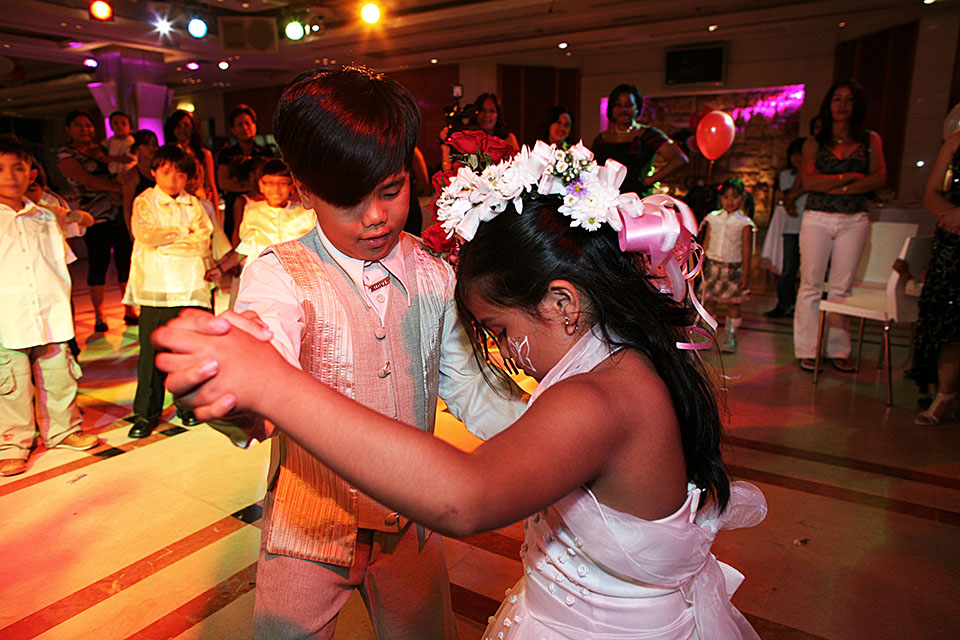 All contents © copyright Amos Roger. 2024 All rights reserved
All contents © copyright Amos Roger. 2024 All rights reservedIsraeli Passport
Marife Adriano, A Project About the Philippine Foreign Workers in Israel
The project documents the fascinating story of Marife Adriano, who has been living in Israel as an illegal foreign worker for the past 14 years. Only recently has she received the status of a temporary resident. This status has enabled her, for the first time in years, to return for a visit to the Philippines and meet those she left behind. I accompanied her during her first correspondences with the Ministry of Interior, all through receiving her residency status as well as her visit to her homeland. Through Marife's story we get a unique glimpse to the world of Philippine immigrant workers in Israel. Her intriguing personal story embodies compassion, warmth, courage and leadership.
This body of photography allows us to see the people who live around us every day, caring for our parents, cleaning our houses. To us, they are transparent, invisible even. This photography project invites you to discover a hidden world that lies within each and every one of us.
This phenomenon of labor migration is a universal phenomenon, part of the globalization process which characterizes the modern world. During the first Intifada in the 1990's, the State of Israel began importing foreign workers from third world countries in order to fill the void in the labor market. Filipinos were the first foreign workers to come to Israel, a migration which has lasted to this day, and as a result the Philippine community is one of the largest and oldest within the foreign worker community. There are about 50,000 Philippine foreign workers in Israel, mostly women who come to work in nursing. Many of them stay in Israel beyond their authorized visas and have children, thus becoming illegal aliens.
In 1995 Marife, mother to 3 year old Kevin, had been working in the Philippines as a manual laborer in a textile factory. From this type of job, her monthly salary amounted to 50 dollars. This salary could not enable her to make a respectable living. In order to allow a better life for her family, she went to work in Israel, leaving her son behind with her parents.
In her early days in Israel she found jobs through an agency located on Allenby St. in Tel-Aviv. After several years, Marife decided to leave the agency and rented an apartment in South Tel-Aviv. She earned her living by cleaning houses and stairways.
Seven years ago, Marife gave birth to a son named Adwin, from an affair she had with a Filipino man who had also been working in Israel. That man returned to the Philippines shortly after his son was born, and since then there has been no contact with him. As an infant, Adwin stayed at a foreign worker day-care near the New Central Bus Station in Tel-Aviv. He'd spend each day at the day-care until 7 pm – when Marife finished her work. At age 6 he began studying at Bialik-Rogozin School in Tel-Aviv. At the same time, in order to acclimatize in Israel, Marife began learning Hebrew in an Evening Ulpan at that same school. Despite the difficulty of raising a child in a foreign country, she always made sure to send a large part of her salary to her family in the Philippines.
In 2005 the State of Israel decided to approve a one-time gesture of granting 900 foreign worker children a status of permanent residency. The criteria for receiving this status required that each child be born in Israel and had been living in Israel for over 6 years. This way, thanks to Adwin, Marife was given a certificate and in July 2008 both she and Adwin left the Ministry of Interior with Identity Cards as well as a permanent residency license which must be renewed every year.
Thanks to this new status, Marife could finally visit her family. On December 2008 she flew with Adwin to the Philippines. There, she met for the first time in 14 years, her 17 year old son Kevin – who now studies Electrical Engineering at the University. These studies were made possible by the money his mother had sent all those years. In addition, the family house had been renovated and their standard of living had improved.
These days Marife lives with Adwin in Tel-Aviv. Her dream is to become an equal citizen in the State of Israel. This photography project took place over a year and a half: from December 2007 to May 2009.
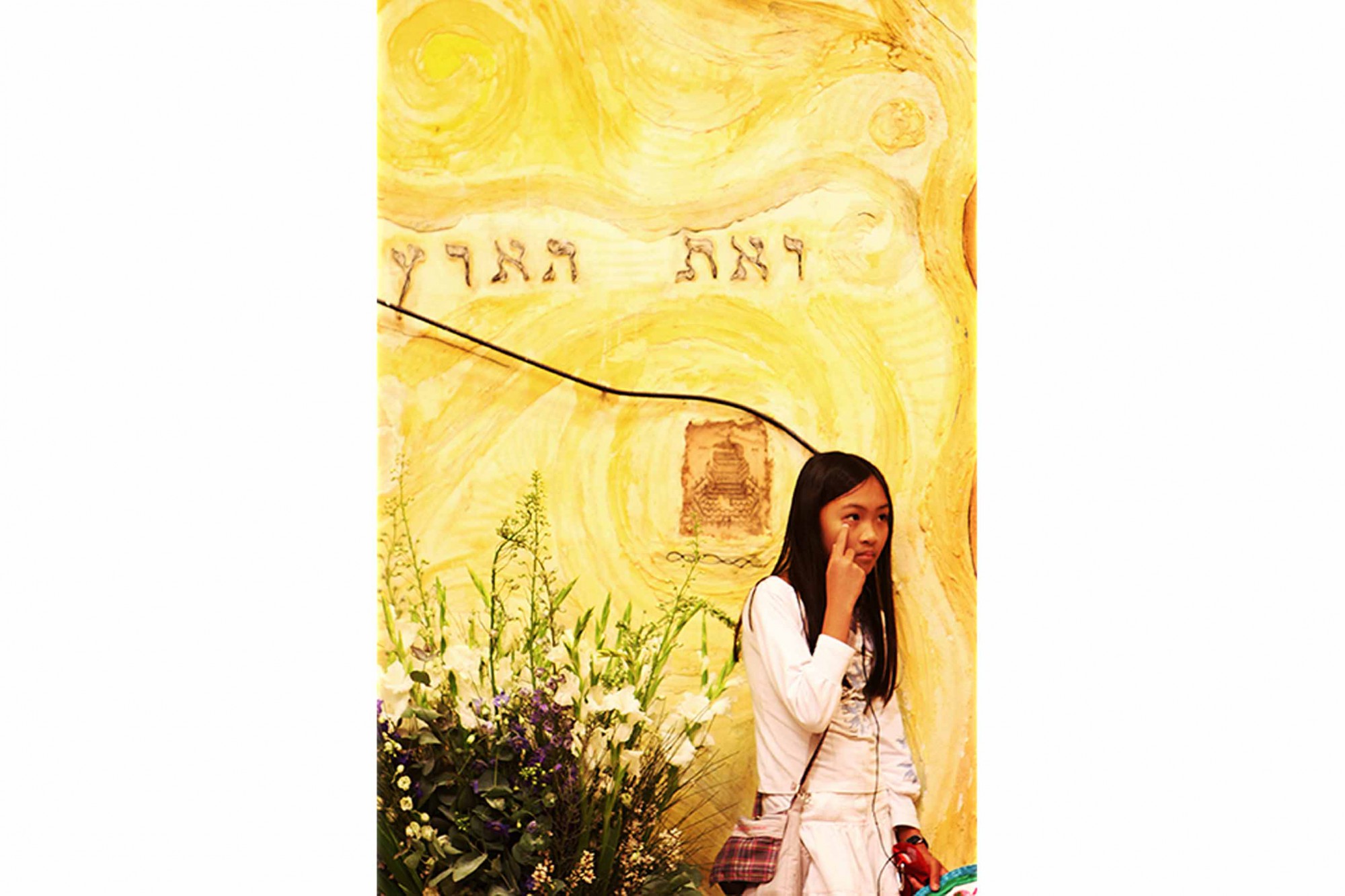 All contents © copyright Amos Roger. 2024 All rights reserved
All contents © copyright Amos Roger. 2024 All rights reservedIsraeli Passport
Marife Adriano, A Project About the Philippine Foreign Workers in Israel
The project documents the fascinating story of Marife Adriano, who has been living in Israel as an illegal foreign worker for the past 14 years. Only recently has she received the status of a temporary resident. This status has enabled her, for the first time in years, to return for a visit to the Philippines and meet those she left behind. I accompanied her during her first correspondences with the Ministry of Interior, all through receiving her residency status as well as her visit to her homeland. Through Marife's story we get a unique glimpse to the world of Philippine immigrant workers in Israel. Her intriguing personal story embodies compassion, warmth, courage and leadership.
This body of photography allows us to see the people who live around us every day, caring for our parents, cleaning our houses. To us, they are transparent, invisible even. This photography project invites you to discover a hidden world that lies within each and every one of us.
This phenomenon of labor migration is a universal phenomenon, part of the globalization process which characterizes the modern world. During the first Intifada in the 1990's, the State of Israel began importing foreign workers from third world countries in order to fill the void in the labor market. Filipinos were the first foreign workers to come to Israel, a migration which has lasted to this day, and as a result the Philippine community is one of the largest and oldest within the foreign worker community. There are about 50,000 Philippine foreign workers in Israel, mostly women who come to work in nursing. Many of them stay in Israel beyond their authorized visas and have children, thus becoming illegal aliens.
In 1995 Marife, mother to 3 year old Kevin, had been working in the Philippines as a manual laborer in a textile factory. From this type of job, her monthly salary amounted to 50 dollars. This salary could not enable her to make a respectable living. In order to allow a better life for her family, she went to work in Israel, leaving her son behind with her parents.
In her early days in Israel she found jobs through an agency located on Allenby St. in Tel-Aviv. After several years, Marife decided to leave the agency and rented an apartment in South Tel-Aviv. She earned her living by cleaning houses and stairways.
Seven years ago, Marife gave birth to a son named Adwin, from an affair she had with a Filipino man who had also been working in Israel. That man returned to the Philippines shortly after his son was born, and since then there has been no contact with him. As an infant, Adwin stayed at a foreign worker day-care near the New Central Bus Station in Tel-Aviv. He'd spend each day at the day-care until 7 pm – when Marife finished her work. At age 6 he began studying at Bialik-Rogozin School in Tel-Aviv. At the same time, in order to acclimatize in Israel, Marife began learning Hebrew in an Evening Ulpan at that same school. Despite the difficulty of raising a child in a foreign country, she always made sure to send a large part of her salary to her family in the Philippines.
In 2005 the State of Israel decided to approve a one-time gesture of granting 900 foreign worker children a status of permanent residency. The criteria for receiving this status required that each child be born in Israel and had been living in Israel for over 6 years. This way, thanks to Adwin, Marife was given a certificate and in July 2008 both she and Adwin left the Ministry of Interior with Identity Cards as well as a permanent residency license which must be renewed every year.
Thanks to this new status, Marife could finally visit her family. On December 2008 she flew with Adwin to the Philippines. There, she met for the first time in 14 years, her 17 year old son Kevin – who now studies Electrical Engineering at the University. These studies were made possible by the money his mother had sent all those years. In addition, the family house had been renovated and their standard of living had improved.
These days Marife lives with Adwin in Tel-Aviv. Her dream is to become an equal citizen in the State of Israel. This photography project took place over a year and a half: from December 2007 to May 2009.
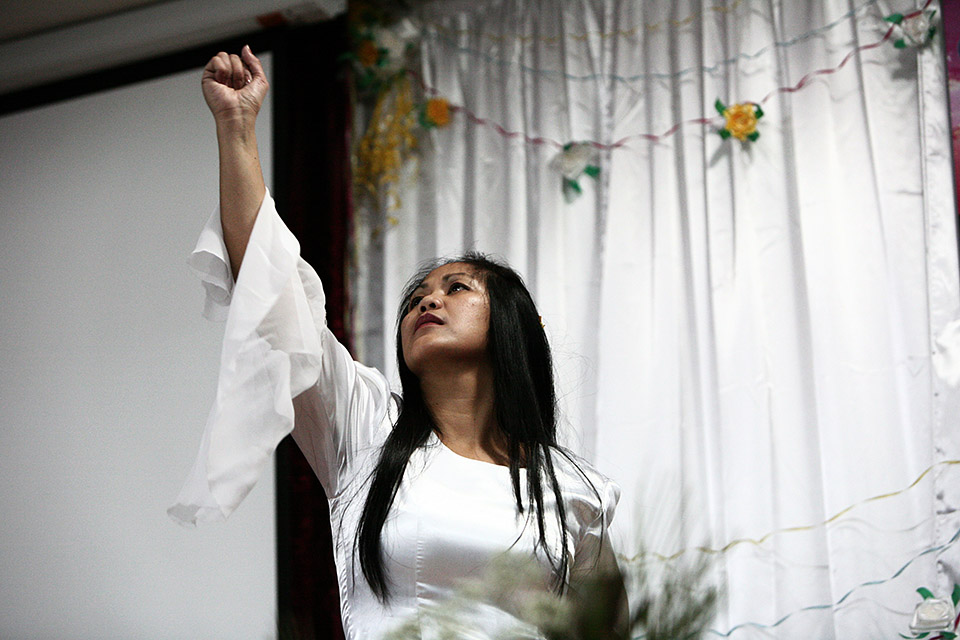 All contents © copyright Amos Roger. 2024 All rights reserved
All contents © copyright Amos Roger. 2024 All rights reservedIsraeli Passport
Marife Adriano, A Project About the Philippine Foreign Workers in Israel
The project documents the fascinating story of Marife Adriano, who has been living in Israel as an illegal foreign worker for the past 14 years. Only recently has she received the status of a temporary resident. This status has enabled her, for the first time in years, to return for a visit to the Philippines and meet those she left behind. I accompanied her during her first correspondences with the Ministry of Interior, all through receiving her residency status as well as her visit to her homeland. Through Marife's story we get a unique glimpse to the world of Philippine immigrant workers in Israel. Her intriguing personal story embodies compassion, warmth, courage and leadership.
This body of photography allows us to see the people who live around us every day, caring for our parents, cleaning our houses. To us, they are transparent, invisible even. This photography project invites you to discover a hidden world that lies within each and every one of us.
This phenomenon of labor migration is a universal phenomenon, part of the globalization process which characterizes the modern world. During the first Intifada in the 1990's, the State of Israel began importing foreign workers from third world countries in order to fill the void in the labor market. Filipinos were the first foreign workers to come to Israel, a migration which has lasted to this day, and as a result the Philippine community is one of the largest and oldest within the foreign worker community. There are about 50,000 Philippine foreign workers in Israel, mostly women who come to work in nursing. Many of them stay in Israel beyond their authorized visas and have children, thus becoming illegal aliens.
In 1995 Marife, mother to 3 year old Kevin, had been working in the Philippines as a manual laborer in a textile factory. From this type of job, her monthly salary amounted to 50 dollars. This salary could not enable her to make a respectable living. In order to allow a better life for her family, she went to work in Israel, leaving her son behind with her parents.
In her early days in Israel she found jobs through an agency located on Allenby St. in Tel-Aviv. After several years, Marife decided to leave the agency and rented an apartment in South Tel-Aviv. She earned her living by cleaning houses and stairways.
Seven years ago, Marife gave birth to a son named Adwin, from an affair she had with a Filipino man who had also been working in Israel. That man returned to the Philippines shortly after his son was born, and since then there has been no contact with him. As an infant, Adwin stayed at a foreign worker day-care near the New Central Bus Station in Tel-Aviv. He'd spend each day at the day-care until 7 pm – when Marife finished her work. At age 6 he began studying at Bialik-Rogozin School in Tel-Aviv. At the same time, in order to acclimatize in Israel, Marife began learning Hebrew in an Evening Ulpan at that same school. Despite the difficulty of raising a child in a foreign country, she always made sure to send a large part of her salary to her family in the Philippines.
In 2005 the State of Israel decided to approve a one-time gesture of granting 900 foreign worker children a status of permanent residency. The criteria for receiving this status required that each child be born in Israel and had been living in Israel for over 6 years. This way, thanks to Adwin, Marife was given a certificate and in July 2008 both she and Adwin left the Ministry of Interior with Identity Cards as well as a permanent residency license which must be renewed every year.
Thanks to this new status, Marife could finally visit her family. On December 2008 she flew with Adwin to the Philippines. There, she met for the first time in 14 years, her 17 year old son Kevin – who now studies Electrical Engineering at the University. These studies were made possible by the money his mother had sent all those years. In addition, the family house had been renovated and their standard of living had improved.
These days Marife lives with Adwin in Tel-Aviv. Her dream is to become an equal citizen in the State of Israel. This photography project took place over a year and a half: from December 2007 to May 2009.
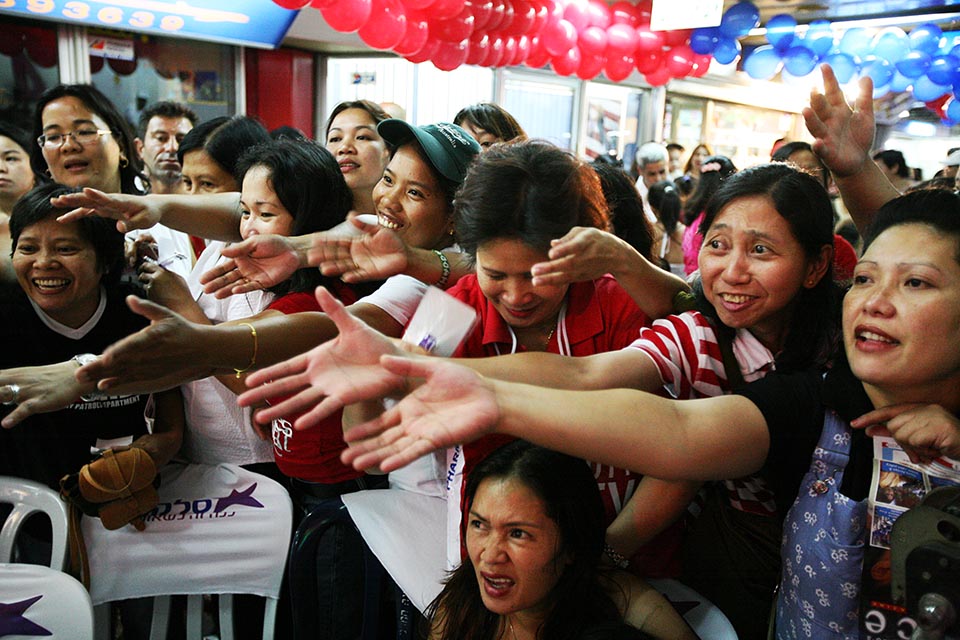 All contents © copyright Amos Roger. 2024 All rights reserved
All contents © copyright Amos Roger. 2024 All rights reservedIsraeli Passport
Marife Adriano, A Project About the Philippine Foreign Workers in Israel
The project documents the fascinating story of Marife Adriano, who has been living in Israel as an illegal foreign worker for the past 14 years. Only recently has she received the status of a temporary resident. This status has enabled her, for the first time in years, to return for a visit to the Philippines and meet those she left behind. I accompanied her during her first correspondences with the Ministry of Interior, all through receiving her residency status as well as her visit to her homeland. Through Marife's story we get a unique glimpse to the world of Philippine immigrant workers in Israel. Her intriguing personal story embodies compassion, warmth, courage and leadership.
This body of photography allows us to see the people who live around us every day, caring for our parents, cleaning our houses. To us, they are transparent, invisible even. This photography project invites you to discover a hidden world that lies within each and every one of us.
This phenomenon of labor migration is a universal phenomenon, part of the globalization process which characterizes the modern world. During the first Intifada in the 1990's, the State of Israel began importing foreign workers from third world countries in order to fill the void in the labor market. Filipinos were the first foreign workers to come to Israel, a migration which has lasted to this day, and as a result the Philippine community is one of the largest and oldest within the foreign worker community. There are about 50,000 Philippine foreign workers in Israel, mostly women who come to work in nursing. Many of them stay in Israel beyond their authorized visas and have children, thus becoming illegal aliens.
In 1995 Marife, mother to 3 year old Kevin, had been working in the Philippines as a manual laborer in a textile factory. From this type of job, her monthly salary amounted to 50 dollars. This salary could not enable her to make a respectable living. In order to allow a better life for her family, she went to work in Israel, leaving her son behind with her parents.
In her early days in Israel she found jobs through an agency located on Allenby St. in Tel-Aviv. After several years, Marife decided to leave the agency and rented an apartment in South Tel-Aviv. She earned her living by cleaning houses and stairways.
Seven years ago, Marife gave birth to a son named Adwin, from an affair she had with a Filipino man who had also been working in Israel. That man returned to the Philippines shortly after his son was born, and since then there has been no contact with him. As an infant, Adwin stayed at a foreign worker day-care near the New Central Bus Station in Tel-Aviv. He'd spend each day at the day-care until 7 pm – when Marife finished her work. At age 6 he began studying at Bialik-Rogozin School in Tel-Aviv. At the same time, in order to acclimatize in Israel, Marife began learning Hebrew in an Evening Ulpan at that same school. Despite the difficulty of raising a child in a foreign country, she always made sure to send a large part of her salary to her family in the Philippines.
In 2005 the State of Israel decided to approve a one-time gesture of granting 900 foreign worker children a status of permanent residency. The criteria for receiving this status required that each child be born in Israel and had been living in Israel for over 6 years. This way, thanks to Adwin, Marife was given a certificate and in July 2008 both she and Adwin left the Ministry of Interior with Identity Cards as well as a permanent residency license which must be renewed every year.
Thanks to this new status, Marife could finally visit her family. On December 2008 she flew with Adwin to the Philippines. There, she met for the first time in 14 years, her 17 year old son Kevin – who now studies Electrical Engineering at the University. These studies were made possible by the money his mother had sent all those years. In addition, the family house had been renovated and their standard of living had improved.
These days Marife lives with Adwin in Tel-Aviv. Her dream is to become an equal citizen in the State of Israel. This photography project took place over a year and a half: from December 2007 to May 2009.
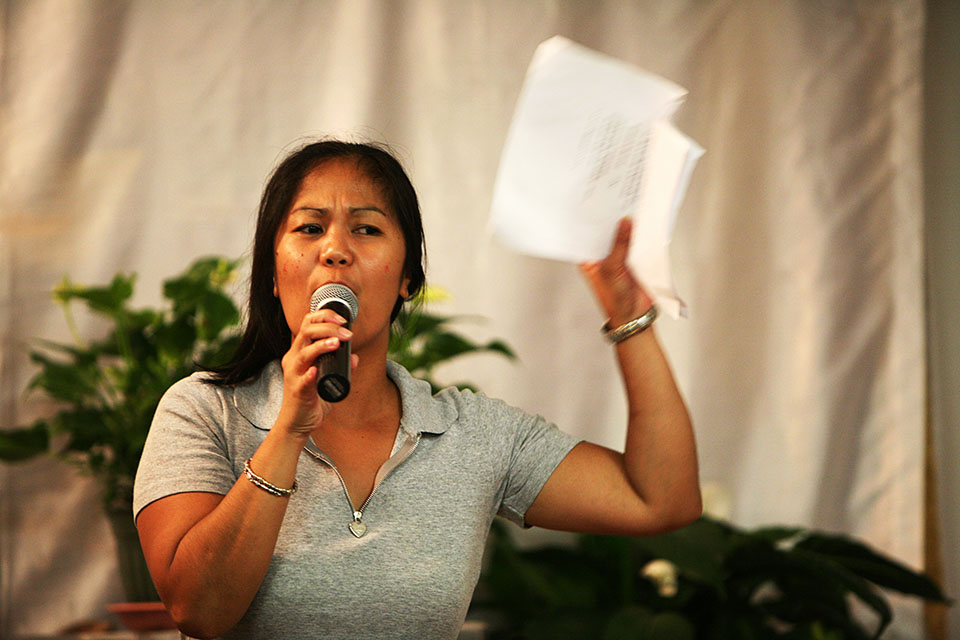 All contents © copyright Amos Roger. 2024 All rights reserved
All contents © copyright Amos Roger. 2024 All rights reservedIsraeli Passport
Marife Adriano, A Project About the Philippine Foreign Workers in Israel
The project documents the fascinating story of Marife Adriano, who has been living in Israel as an illegal foreign worker for the past 14 years. Only recently has she received the status of a temporary resident. This status has enabled her, for the first time in years, to return for a visit to the Philippines and meet those she left behind. I accompanied her during her first correspondences with the Ministry of Interior, all through receiving her residency status as well as her visit to her homeland. Through Marife's story we get a unique glimpse to the world of Philippine immigrant workers in Israel. Her intriguing personal story embodies compassion, warmth, courage and leadership.
This body of photography allows us to see the people who live around us every day, caring for our parents, cleaning our houses. To us, they are transparent, invisible even. This photography project invites you to discover a hidden world that lies within each and every one of us.
This phenomenon of labor migration is a universal phenomenon, part of the globalization process which characterizes the modern world. During the first Intifada in the 1990's, the State of Israel began importing foreign workers from third world countries in order to fill the void in the labor market. Filipinos were the first foreign workers to come to Israel, a migration which has lasted to this day, and as a result the Philippine community is one of the largest and oldest within the foreign worker community. There are about 50,000 Philippine foreign workers in Israel, mostly women who come to work in nursing. Many of them stay in Israel beyond their authorized visas and have children, thus becoming illegal aliens.
In 1995 Marife, mother to 3 year old Kevin, had been working in the Philippines as a manual laborer in a textile factory. From this type of job, her monthly salary amounted to 50 dollars. This salary could not enable her to make a respectable living. In order to allow a better life for her family, she went to work in Israel, leaving her son behind with her parents.
In her early days in Israel she found jobs through an agency located on Allenby St. in Tel-Aviv. After several years, Marife decided to leave the agency and rented an apartment in South Tel-Aviv. She earned her living by cleaning houses and stairways.
Seven years ago, Marife gave birth to a son named Adwin, from an affair she had with a Filipino man who had also been working in Israel. That man returned to the Philippines shortly after his son was born, and since then there has been no contact with him. As an infant, Adwin stayed at a foreign worker day-care near the New Central Bus Station in Tel-Aviv. He'd spend each day at the day-care until 7 pm – when Marife finished her work. At age 6 he began studying at Bialik-Rogozin School in Tel-Aviv. At the same time, in order to acclimatize in Israel, Marife began learning Hebrew in an Evening Ulpan at that same school. Despite the difficulty of raising a child in a foreign country, she always made sure to send a large part of her salary to her family in the Philippines.
In 2005 the State of Israel decided to approve a one-time gesture of granting 900 foreign worker children a status of permanent residency. The criteria for receiving this status required that each child be born in Israel and had been living in Israel for over 6 years. This way, thanks to Adwin, Marife was given a certificate and in July 2008 both she and Adwin left the Ministry of Interior with Identity Cards as well as a permanent residency license which must be renewed every year.
Thanks to this new status, Marife could finally visit her family. On December 2008 she flew with Adwin to the Philippines. There, she met for the first time in 14 years, her 17 year old son Kevin – who now studies Electrical Engineering at the University. These studies were made possible by the money his mother had sent all those years. In addition, the family house had been renovated and their standard of living had improved.
These days Marife lives with Adwin in Tel-Aviv. Her dream is to become an equal citizen in the State of Israel. This photography project took place over a year and a half: from December 2007 to May 2009.
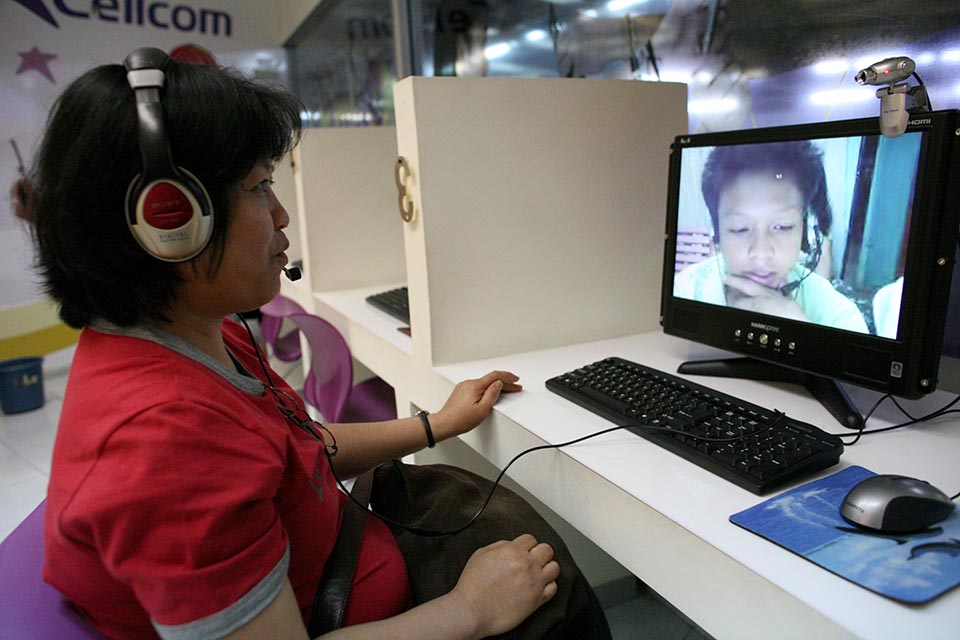 All contents © copyright Amos Roger. 2024 All rights reserved
All contents © copyright Amos Roger. 2024 All rights reservedIsraeli Passport
Marife Adriano, A Project About the Philippine Foreign Workers in Israel
The project documents the fascinating story of Marife Adriano, who has been living in Israel as an illegal foreign worker for the past 14 years. Only recently has she received the status of a temporary resident. This status has enabled her, for the first time in years, to return for a visit to the Philippines and meet those she left behind. I accompanied her during her first correspondences with the Ministry of Interior, all through receiving her residency status as well as her visit to her homeland. Through Marife's story we get a unique glimpse to the world of Philippine immigrant workers in Israel. Her intriguing personal story embodies compassion, warmth, courage and leadership.
This body of photography allows us to see the people who live around us every day, caring for our parents, cleaning our houses. To us, they are transparent, invisible even. This photography project invites you to discover a hidden world that lies within each and every one of us.
This phenomenon of labor migration is a universal phenomenon, part of the globalization process which characterizes the modern world. During the first Intifada in the 1990's, the State of Israel began importing foreign workers from third world countries in order to fill the void in the labor market. Filipinos were the first foreign workers to come to Israel, a migration which has lasted to this day, and as a result the Philippine community is one of the largest and oldest within the foreign worker community. There are about 50,000 Philippine foreign workers in Israel, mostly women who come to work in nursing. Many of them stay in Israel beyond their authorized visas and have children, thus becoming illegal aliens.
In 1995 Marife, mother to 3 year old Kevin, had been working in the Philippines as a manual laborer in a textile factory. From this type of job, her monthly salary amounted to 50 dollars. This salary could not enable her to make a respectable living. In order to allow a better life for her family, she went to work in Israel, leaving her son behind with her parents.
In her early days in Israel she found jobs through an agency located on Allenby St. in Tel-Aviv. After several years, Marife decided to leave the agency and rented an apartment in South Tel-Aviv. She earned her living by cleaning houses and stairways.
Seven years ago, Marife gave birth to a son named Adwin, from an affair she had with a Filipino man who had also been working in Israel. That man returned to the Philippines shortly after his son was born, and since then there has been no contact with him. As an infant, Adwin stayed at a foreign worker day-care near the New Central Bus Station in Tel-Aviv. He'd spend each day at the day-care until 7 pm – when Marife finished her work. At age 6 he began studying at Bialik-Rogozin School in Tel-Aviv. At the same time, in order to acclimatize in Israel, Marife began learning Hebrew in an Evening Ulpan at that same school. Despite the difficulty of raising a child in a foreign country, she always made sure to send a large part of her salary to her family in the Philippines.
In 2005 the State of Israel decided to approve a one-time gesture of granting 900 foreign worker children a status of permanent residency. The criteria for receiving this status required that each child be born in Israel and had been living in Israel for over 6 years. This way, thanks to Adwin, Marife was given a certificate and in July 2008 both she and Adwin left the Ministry of Interior with Identity Cards as well as a permanent residency license which must be renewed every year.
Thanks to this new status, Marife could finally visit her family. On December 2008 she flew with Adwin to the Philippines. There, she met for the first time in 14 years, her 17 year old son Kevin – who now studies Electrical Engineering at the University. These studies were made possible by the money his mother had sent all those years. In addition, the family house had been renovated and their standard of living had improved.
These days Marife lives with Adwin in Tel-Aviv. Her dream is to become an equal citizen in the State of Israel. This photography project took place over a year and a half: from December 2007 to May 2009.
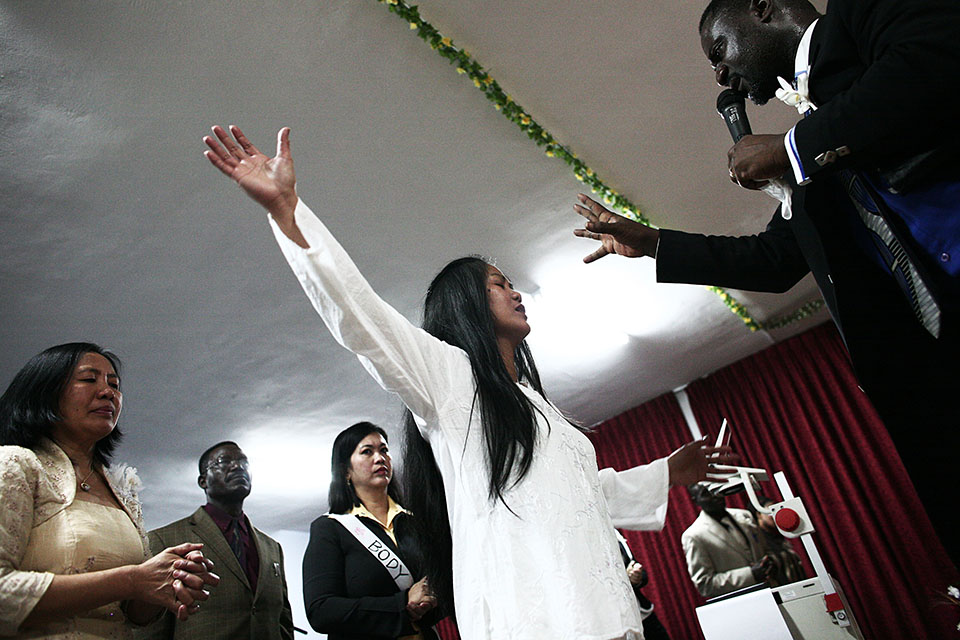 All contents © copyright Amos Roger. 2024 All rights reserved
All contents © copyright Amos Roger. 2024 All rights reservedIsraeli Passport
Marife Adriano, A Project About the Philippine Foreign Workers in Israel
The project documents the fascinating story of Marife Adriano, who has been living in Israel as an illegal foreign worker for the past 14 years. Only recently has she received the status of a temporary resident. This status has enabled her, for the first time in years, to return for a visit to the Philippines and meet those she left behind. I accompanied her during her first correspondences with the Ministry of Interior, all through receiving her residency status as well as her visit to her homeland. Through Marife's story we get a unique glimpse to the world of Philippine immigrant workers in Israel. Her intriguing personal story embodies compassion, warmth, courage and leadership.
This body of photography allows us to see the people who live around us every day, caring for our parents, cleaning our houses. To us, they are transparent, invisible even. This photography project invites you to discover a hidden world that lies within each and every one of us.
This phenomenon of labor migration is a universal phenomenon, part of the globalization process which characterizes the modern world. During the first Intifada in the 1990's, the State of Israel began importing foreign workers from third world countries in order to fill the void in the labor market. Filipinos were the first foreign workers to come to Israel, a migration which has lasted to this day, and as a result the Philippine community is one of the largest and oldest within the foreign worker community. There are about 50,000 Philippine foreign workers in Israel, mostly women who come to work in nursing. Many of them stay in Israel beyond their authorized visas and have children, thus becoming illegal aliens.
In 1995 Marife, mother to 3 year old Kevin, had been working in the Philippines as a manual laborer in a textile factory. From this type of job, her monthly salary amounted to 50 dollars. This salary could not enable her to make a respectable living. In order to allow a better life for her family, she went to work in Israel, leaving her son behind with her parents.
In her early days in Israel she found jobs through an agency located on Allenby St. in Tel-Aviv. After several years, Marife decided to leave the agency and rented an apartment in South Tel-Aviv. She earned her living by cleaning houses and stairways.
Seven years ago, Marife gave birth to a son named Adwin, from an affair she had with a Filipino man who had also been working in Israel. That man returned to the Philippines shortly after his son was born, and since then there has been no contact with him. As an infant, Adwin stayed at a foreign worker day-care near the New Central Bus Station in Tel-Aviv. He'd spend each day at the day-care until 7 pm – when Marife finished her work. At age 6 he began studying at Bialik-Rogozin School in Tel-Aviv. At the same time, in order to acclimatize in Israel, Marife began learning Hebrew in an Evening Ulpan at that same school. Despite the difficulty of raising a child in a foreign country, she always made sure to send a large part of her salary to her family in the Philippines.
In 2005 the State of Israel decided to approve a one-time gesture of granting 900 foreign worker children a status of permanent residency. The criteria for receiving this status required that each child be born in Israel and had been living in Israel for over 6 years. This way, thanks to Adwin, Marife was given a certificate and in July 2008 both she and Adwin left the Ministry of Interior with Identity Cards as well as a permanent residency license which must be renewed every year.
Thanks to this new status, Marife could finally visit her family. On December 2008 she flew with Adwin to the Philippines. There, she met for the first time in 14 years, her 17 year old son Kevin – who now studies Electrical Engineering at the University. These studies were made possible by the money his mother had sent all those years. In addition, the family house had been renovated and their standard of living had improved.
These days Marife lives with Adwin in Tel-Aviv. Her dream is to become an equal citizen in the State of Israel. This photography project took place over a year and a half: from December 2007 to May 2009.
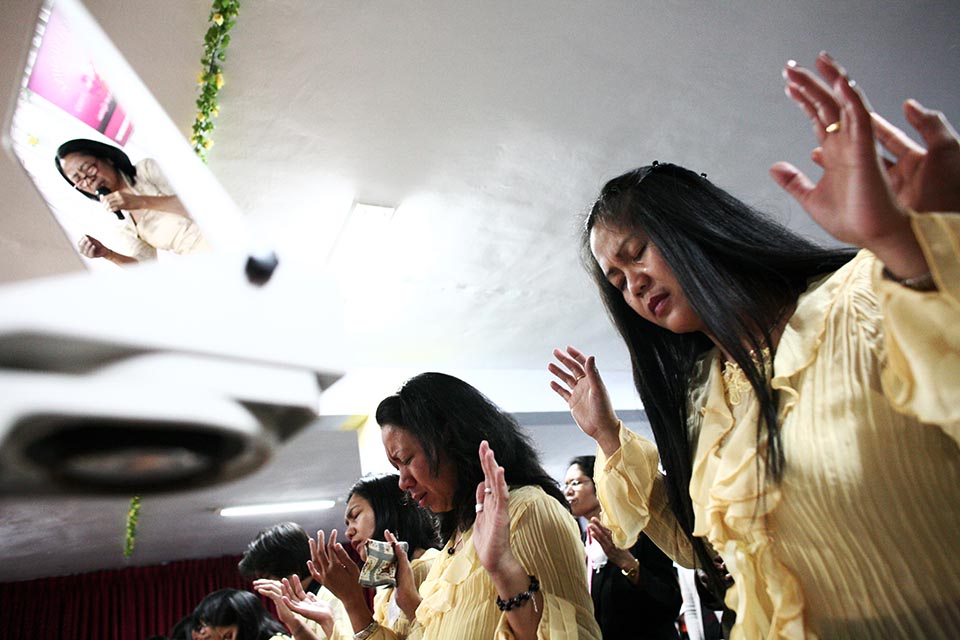 All contents © copyright Amos Roger. 2024 All rights reserved
All contents © copyright Amos Roger. 2024 All rights reservedIsraeli Passport
Marife Adriano, A Project About the Philippine Foreign Workers in Israel
The project documents the fascinating story of Marife Adriano, who has been living in Israel as an illegal foreign worker for the past 14 years. Only recently has she received the status of a temporary resident. This status has enabled her, for the first time in years, to return for a visit to the Philippines and meet those she left behind. I accompanied her during her first correspondences with the Ministry of Interior, all through receiving her residency status as well as her visit to her homeland. Through Marife's story we get a unique glimpse to the world of Philippine immigrant workers in Israel. Her intriguing personal story embodies compassion, warmth, courage and leadership.
This body of photography allows us to see the people who live around us every day, caring for our parents, cleaning our houses. To us, they are transparent, invisible even. This photography project invites you to discover a hidden world that lies within each and every one of us.
This phenomenon of labor migration is a universal phenomenon, part of the globalization process which characterizes the modern world. During the first Intifada in the 1990's, the State of Israel began importing foreign workers from third world countries in order to fill the void in the labor market. Filipinos were the first foreign workers to come to Israel, a migration which has lasted to this day, and as a result the Philippine community is one of the largest and oldest within the foreign worker community. There are about 50,000 Philippine foreign workers in Israel, mostly women who come to work in nursing. Many of them stay in Israel beyond their authorized visas and have children, thus becoming illegal aliens.
In 1995 Marife, mother to 3 year old Kevin, had been working in the Philippines as a manual laborer in a textile factory. From this type of job, her monthly salary amounted to 50 dollars. This salary could not enable her to make a respectable living. In order to allow a better life for her family, she went to work in Israel, leaving her son behind with her parents.
In her early days in Israel she found jobs through an agency located on Allenby St. in Tel-Aviv. After several years, Marife decided to leave the agency and rented an apartment in South Tel-Aviv. She earned her living by cleaning houses and stairways.
Seven years ago, Marife gave birth to a son named Adwin, from an affair she had with a Filipino man who had also been working in Israel. That man returned to the Philippines shortly after his son was born, and since then there has been no contact with him. As an infant, Adwin stayed at a foreign worker day-care near the New Central Bus Station in Tel-Aviv. He'd spend each day at the day-care until 7 pm – when Marife finished her work. At age 6 he began studying at Bialik-Rogozin School in Tel-Aviv. At the same time, in order to acclimatize in Israel, Marife began learning Hebrew in an Evening Ulpan at that same school. Despite the difficulty of raising a child in a foreign country, she always made sure to send a large part of her salary to her family in the Philippines.
In 2005 the State of Israel decided to approve a one-time gesture of granting 900 foreign worker children a status of permanent residency. The criteria for receiving this status required that each child be born in Israel and had been living in Israel for over 6 years. This way, thanks to Adwin, Marife was given a certificate and in July 2008 both she and Adwin left the Ministry of Interior with Identity Cards as well as a permanent residency license which must be renewed every year.
Thanks to this new status, Marife could finally visit her family. On December 2008 she flew with Adwin to the Philippines. There, she met for the first time in 14 years, her 17 year old son Kevin – who now studies Electrical Engineering at the University. These studies were made possible by the money his mother had sent all those years. In addition, the family house had been renovated and their standard of living had improved.
These days Marife lives with Adwin in Tel-Aviv. Her dream is to become an equal citizen in the State of Israel. This photography project took place over a year and a half: from December 2007 to May 2009.
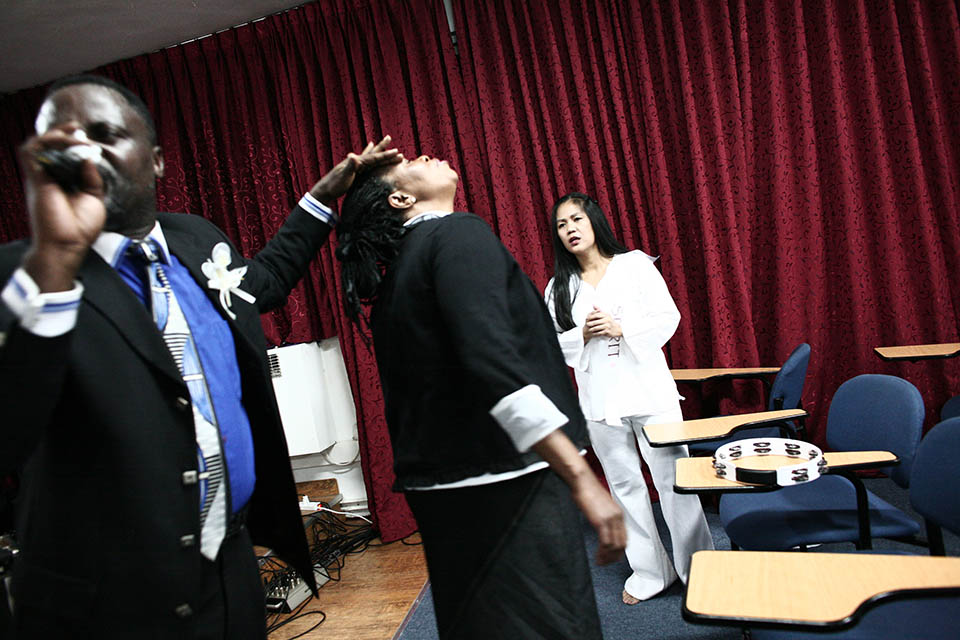 All contents © copyright Amos Roger. 2024 All rights reserved
All contents © copyright Amos Roger. 2024 All rights reservedIsraeli Passport
Marife Adriano, A Project About the Philippine Foreign Workers in Israel
The project documents the fascinating story of Marife Adriano, who has been living in Israel as an illegal foreign worker for the past 14 years. Only recently has she received the status of a temporary resident. This status has enabled her, for the first time in years, to return for a visit to the Philippines and meet those she left behind. I accompanied her during her first correspondences with the Ministry of Interior, all through receiving her residency status as well as her visit to her homeland. Through Marife's story we get a unique glimpse to the world of Philippine immigrant workers in Israel. Her intriguing personal story embodies compassion, warmth, courage and leadership.
This body of photography allows us to see the people who live around us every day, caring for our parents, cleaning our houses. To us, they are transparent, invisible even. This photography project invites you to discover a hidden world that lies within each and every one of us.
This phenomenon of labor migration is a universal phenomenon, part of the globalization process which characterizes the modern world. During the first Intifada in the 1990's, the State of Israel began importing foreign workers from third world countries in order to fill the void in the labor market. Filipinos were the first foreign workers to come to Israel, a migration which has lasted to this day, and as a result the Philippine community is one of the largest and oldest within the foreign worker community. There are about 50,000 Philippine foreign workers in Israel, mostly women who come to work in nursing. Many of them stay in Israel beyond their authorized visas and have children, thus becoming illegal aliens.
In 1995 Marife, mother to 3 year old Kevin, had been working in the Philippines as a manual laborer in a textile factory. From this type of job, her monthly salary amounted to 50 dollars. This salary could not enable her to make a respectable living. In order to allow a better life for her family, she went to work in Israel, leaving her son behind with her parents.
In her early days in Israel she found jobs through an agency located on Allenby St. in Tel-Aviv. After several years, Marife decided to leave the agency and rented an apartment in South Tel-Aviv. She earned her living by cleaning houses and stairways.
Seven years ago, Marife gave birth to a son named Adwin, from an affair she had with a Filipino man who had also been working in Israel. That man returned to the Philippines shortly after his son was born, and since then there has been no contact with him. As an infant, Adwin stayed at a foreign worker day-care near the New Central Bus Station in Tel-Aviv. He'd spend each day at the day-care until 7 pm – when Marife finished her work. At age 6 he began studying at Bialik-Rogozin School in Tel-Aviv. At the same time, in order to acclimatize in Israel, Marife began learning Hebrew in an Evening Ulpan at that same school. Despite the difficulty of raising a child in a foreign country, she always made sure to send a large part of her salary to her family in the Philippines.
In 2005 the State of Israel decided to approve a one-time gesture of granting 900 foreign worker children a status of permanent residency. The criteria for receiving this status required that each child be born in Israel and had been living in Israel for over 6 years. This way, thanks to Adwin, Marife was given a certificate and in July 2008 both she and Adwin left the Ministry of Interior with Identity Cards as well as a permanent residency license which must be renewed every year.
Thanks to this new status, Marife could finally visit her family. On December 2008 she flew with Adwin to the Philippines. There, she met for the first time in 14 years, her 17 year old son Kevin – who now studies Electrical Engineering at the University. These studies were made possible by the money his mother had sent all those years. In addition, the family house had been renovated and their standard of living had improved.
These days Marife lives with Adwin in Tel-Aviv. Her dream is to become an equal citizen in the State of Israel. This photography project took place over a year and a half: from December 2007 to May 2009.
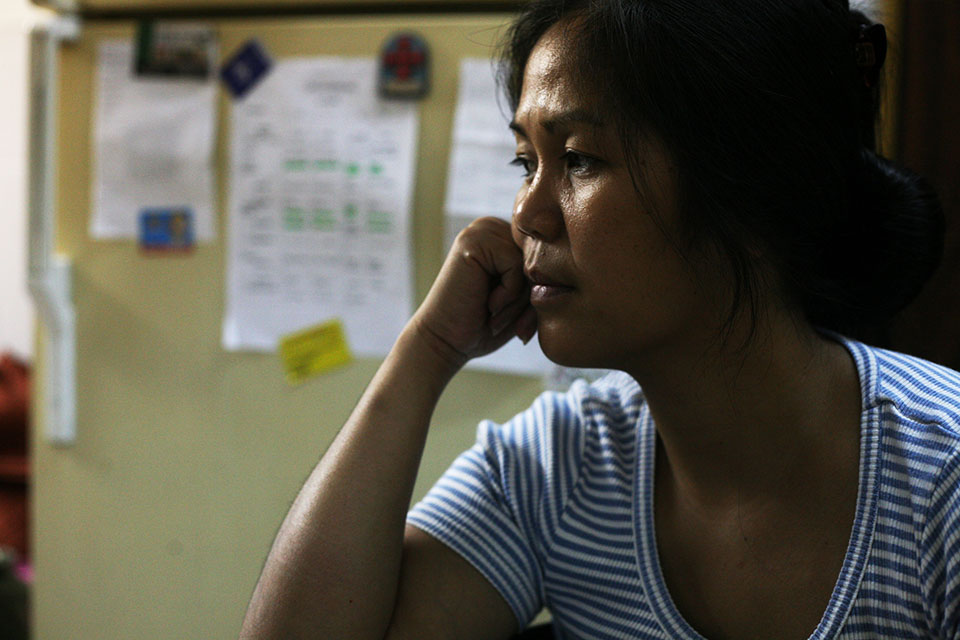 All contents © copyright Amos Roger. 2024 All rights reserved
All contents © copyright Amos Roger. 2024 All rights reservedIsraeli Passport
Marife Adriano, A Project About the Philippine Foreign Workers in Israel
The project documents the fascinating story of Marife Adriano, who has been living in Israel as an illegal foreign worker for the past 14 years. Only recently has she received the status of a temporary resident. This status has enabled her, for the first time in years, to return for a visit to the Philippines and meet those she left behind. I accompanied her during her first correspondences with the Ministry of Interior, all through receiving her residency status as well as her visit to her homeland. Through Marife's story we get a unique glimpse to the world of Philippine immigrant workers in Israel. Her intriguing personal story embodies compassion, warmth, courage and leadership.
This body of photography allows us to see the people who live around us every day, caring for our parents, cleaning our houses. To us, they are transparent, invisible even. This photography project invites you to discover a hidden world that lies within each and every one of us.
This phenomenon of labor migration is a universal phenomenon, part of the globalization process which characterizes the modern world. During the first Intifada in the 1990's, the State of Israel began importing foreign workers from third world countries in order to fill the void in the labor market. Filipinos were the first foreign workers to come to Israel, a migration which has lasted to this day, and as a result the Philippine community is one of the largest and oldest within the foreign worker community. There are about 50,000 Philippine foreign workers in Israel, mostly women who come to work in nursing. Many of them stay in Israel beyond their authorized visas and have children, thus becoming illegal aliens.
In 1995 Marife, mother to 3 year old Kevin, had been working in the Philippines as a manual laborer in a textile factory. From this type of job, her monthly salary amounted to 50 dollars. This salary could not enable her to make a respectable living. In order to allow a better life for her family, she went to work in Israel, leaving her son behind with her parents.
In her early days in Israel she found jobs through an agency located on Allenby St. in Tel-Aviv. After several years, Marife decided to leave the agency and rented an apartment in South Tel-Aviv. She earned her living by cleaning houses and stairways.
Seven years ago, Marife gave birth to a son named Adwin, from an affair she had with a Filipino man who had also been working in Israel. That man returned to the Philippines shortly after his son was born, and since then there has been no contact with him. As an infant, Adwin stayed at a foreign worker day-care near the New Central Bus Station in Tel-Aviv. He'd spend each day at the day-care until 7 pm – when Marife finished her work. At age 6 he began studying at Bialik-Rogozin School in Tel-Aviv. At the same time, in order to acclimatize in Israel, Marife began learning Hebrew in an Evening Ulpan at that same school. Despite the difficulty of raising a child in a foreign country, she always made sure to send a large part of her salary to her family in the Philippines.
In 2005 the State of Israel decided to approve a one-time gesture of granting 900 foreign worker children a status of permanent residency. The criteria for receiving this status required that each child be born in Israel and had been living in Israel for over 6 years. This way, thanks to Adwin, Marife was given a certificate and in July 2008 both she and Adwin left the Ministry of Interior with Identity Cards as well as a permanent residency license which must be renewed every year.
Thanks to this new status, Marife could finally visit her family. On December 2008 she flew with Adwin to the Philippines. There, she met for the first time in 14 years, her 17 year old son Kevin – who now studies Electrical Engineering at the University. These studies were made possible by the money his mother had sent all those years. In addition, the family house had been renovated and their standard of living had improved.
These days Marife lives with Adwin in Tel-Aviv. Her dream is to become an equal citizen in the State of Israel. This photography project took place over a year and a half: from December 2007 to May 2009.
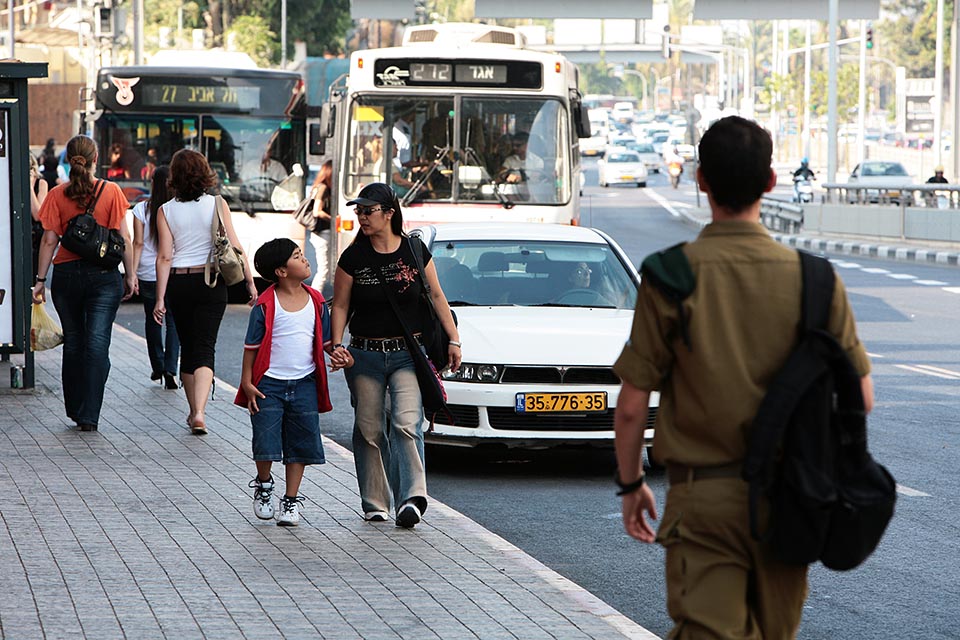 All contents © copyright Amos Roger. 2024 All rights reserved
All contents © copyright Amos Roger. 2024 All rights reservedIsraeli Passport
Marife Adriano, A Project About the Philippine Foreign Workers in Israel
The project documents the fascinating story of Marife Adriano, who has been living in Israel as an illegal foreign worker for the past 14 years. Only recently has she received the status of a temporary resident. This status has enabled her, for the first time in years, to return for a visit to the Philippines and meet those she left behind. I accompanied her during her first correspondences with the Ministry of Interior, all through receiving her residency status as well as her visit to her homeland. Through Marife's story we get a unique glimpse to the world of Philippine immigrant workers in Israel. Her intriguing personal story embodies compassion, warmth, courage and leadership.
This body of photography allows us to see the people who live around us every day, caring for our parents, cleaning our houses. To us, they are transparent, invisible even. This photography project invites you to discover a hidden world that lies within each and every one of us.
This phenomenon of labor migration is a universal phenomenon, part of the globalization process which characterizes the modern world. During the first Intifada in the 1990's, the State of Israel began importing foreign workers from third world countries in order to fill the void in the labor market. Filipinos were the first foreign workers to come to Israel, a migration which has lasted to this day, and as a result the Philippine community is one of the largest and oldest within the foreign worker community. There are about 50,000 Philippine foreign workers in Israel, mostly women who come to work in nursing. Many of them stay in Israel beyond their authorized visas and have children, thus becoming illegal aliens.
In 1995 Marife, mother to 3 year old Kevin, had been working in the Philippines as a manual laborer in a textile factory. From this type of job, her monthly salary amounted to 50 dollars. This salary could not enable her to make a respectable living. In order to allow a better life for her family, she went to work in Israel, leaving her son behind with her parents.
In her early days in Israel she found jobs through an agency located on Allenby St. in Tel-Aviv. After several years, Marife decided to leave the agency and rented an apartment in South Tel-Aviv. She earned her living by cleaning houses and stairways.
Seven years ago, Marife gave birth to a son named Adwin, from an affair she had with a Filipino man who had also been working in Israel. That man returned to the Philippines shortly after his son was born, and since then there has been no contact with him. As an infant, Adwin stayed at a foreign worker day-care near the New Central Bus Station in Tel-Aviv. He'd spend each day at the day-care until 7 pm – when Marife finished her work. At age 6 he began studying at Bialik-Rogozin School in Tel-Aviv. At the same time, in order to acclimatize in Israel, Marife began learning Hebrew in an Evening Ulpan at that same school. Despite the difficulty of raising a child in a foreign country, she always made sure to send a large part of her salary to her family in the Philippines.
In 2005 the State of Israel decided to approve a one-time gesture of granting 900 foreign worker children a status of permanent residency. The criteria for receiving this status required that each child be born in Israel and had been living in Israel for over 6 years. This way, thanks to Adwin, Marife was given a certificate and in July 2008 both she and Adwin left the Ministry of Interior with Identity Cards as well as a permanent residency license which must be renewed every year.
Thanks to this new status, Marife could finally visit her family. On December 2008 she flew with Adwin to the Philippines. There, she met for the first time in 14 years, her 17 year old son Kevin – who now studies Electrical Engineering at the University. These studies were made possible by the money his mother had sent all those years. In addition, the family house had been renovated and their standard of living had improved.
These days Marife lives with Adwin in Tel-Aviv. Her dream is to become an equal citizen in the State of Israel. This photography project took place over a year and a half: from December 2007 to May 2009.
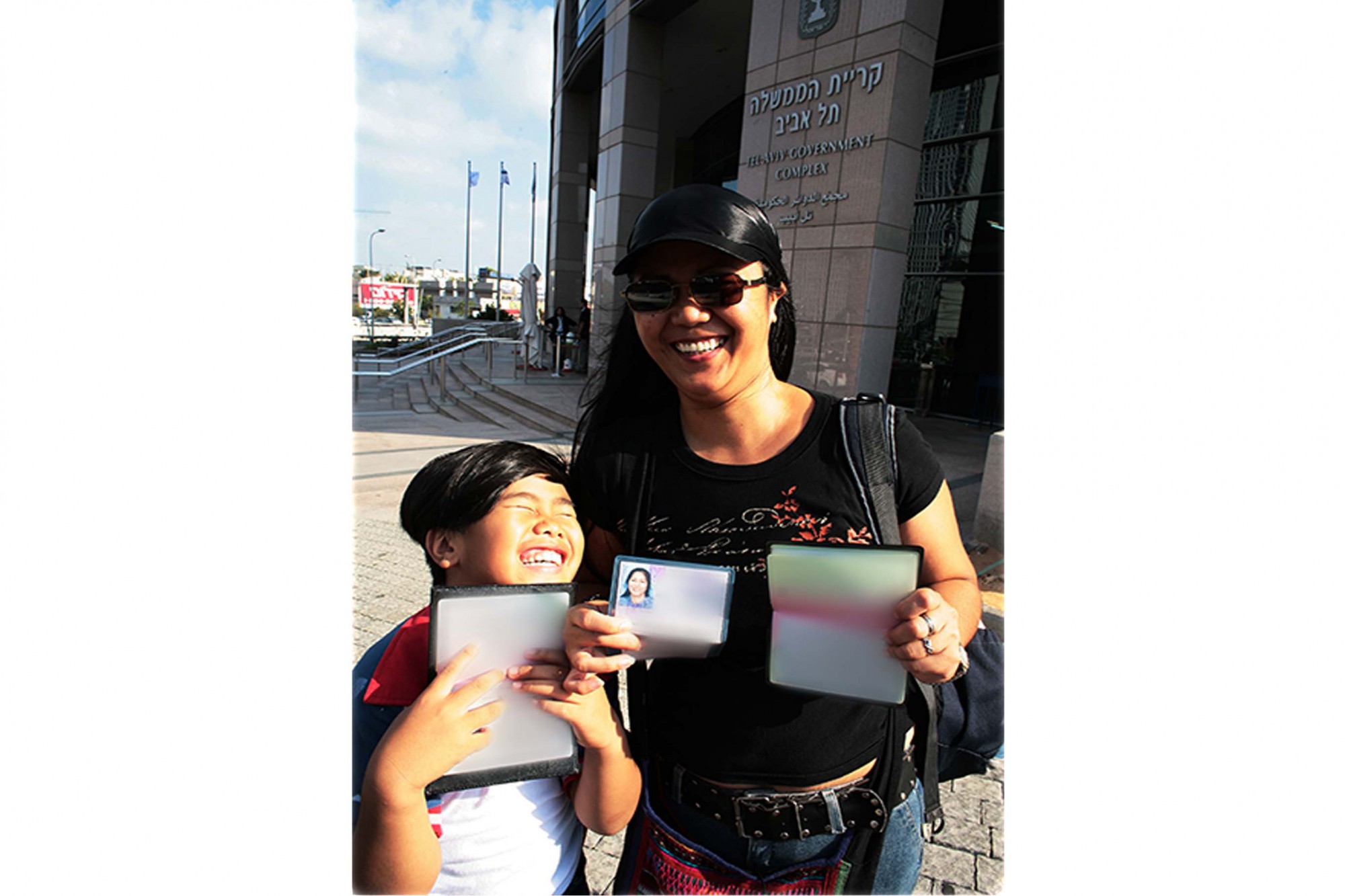 All contents © copyright Amos Roger. 2024 All rights reserved
All contents © copyright Amos Roger. 2024 All rights reservedIsraeli Passport
Marife Adriano, A Project About the Philippine Foreign Workers in Israel
The project documents the fascinating story of Marife Adriano, who has been living in Israel as an illegal foreign worker for the past 14 years. Only recently has she received the status of a temporary resident. This status has enabled her, for the first time in years, to return for a visit to the Philippines and meet those she left behind. I accompanied her during her first correspondences with the Ministry of Interior, all through receiving her residency status as well as her visit to her homeland. Through Marife's story we get a unique glimpse to the world of Philippine immigrant workers in Israel. Her intriguing personal story embodies compassion, warmth, courage and leadership.
This body of photography allows us to see the people who live around us every day, caring for our parents, cleaning our houses. To us, they are transparent, invisible even. This photography project invites you to discover a hidden world that lies within each and every one of us.
This phenomenon of labor migration is a universal phenomenon, part of the globalization process which characterizes the modern world. During the first Intifada in the 1990's, the State of Israel began importing foreign workers from third world countries in order to fill the void in the labor market. Filipinos were the first foreign workers to come to Israel, a migration which has lasted to this day, and as a result the Philippine community is one of the largest and oldest within the foreign worker community. There are about 50,000 Philippine foreign workers in Israel, mostly women who come to work in nursing. Many of them stay in Israel beyond their authorized visas and have children, thus becoming illegal aliens.
In 1995 Marife, mother to 3 year old Kevin, had been working in the Philippines as a manual laborer in a textile factory. From this type of job, her monthly salary amounted to 50 dollars. This salary could not enable her to make a respectable living. In order to allow a better life for her family, she went to work in Israel, leaving her son behind with her parents.
In her early days in Israel she found jobs through an agency located on Allenby St. in Tel-Aviv. After several years, Marife decided to leave the agency and rented an apartment in South Tel-Aviv. She earned her living by cleaning houses and stairways.
Seven years ago, Marife gave birth to a son named Adwin, from an affair she had with a Filipino man who had also been working in Israel. That man returned to the Philippines shortly after his son was born, and since then there has been no contact with him. As an infant, Adwin stayed at a foreign worker day-care near the New Central Bus Station in Tel-Aviv. He'd spend each day at the day-care until 7 pm – when Marife finished her work. At age 6 he began studying at Bialik-Rogozin School in Tel-Aviv. At the same time, in order to acclimatize in Israel, Marife began learning Hebrew in an Evening Ulpan at that same school. Despite the difficulty of raising a child in a foreign country, she always made sure to send a large part of her salary to her family in the Philippines.
In 2005 the State of Israel decided to approve a one-time gesture of granting 900 foreign worker children a status of permanent residency. The criteria for receiving this status required that each child be born in Israel and had been living in Israel for over 6 years. This way, thanks to Adwin, Marife was given a certificate and in July 2008 both she and Adwin left the Ministry of Interior with Identity Cards as well as a permanent residency license which must be renewed every year.
Thanks to this new status, Marife could finally visit her family. On December 2008 she flew with Adwin to the Philippines. There, she met for the first time in 14 years, her 17 year old son Kevin – who now studies Electrical Engineering at the University. These studies were made possible by the money his mother had sent all those years. In addition, the family house had been renovated and their standard of living had improved.
These days Marife lives with Adwin in Tel-Aviv. Her dream is to become an equal citizen in the State of Israel. This photography project took place over a year and a half: from December 2007 to May 2009.
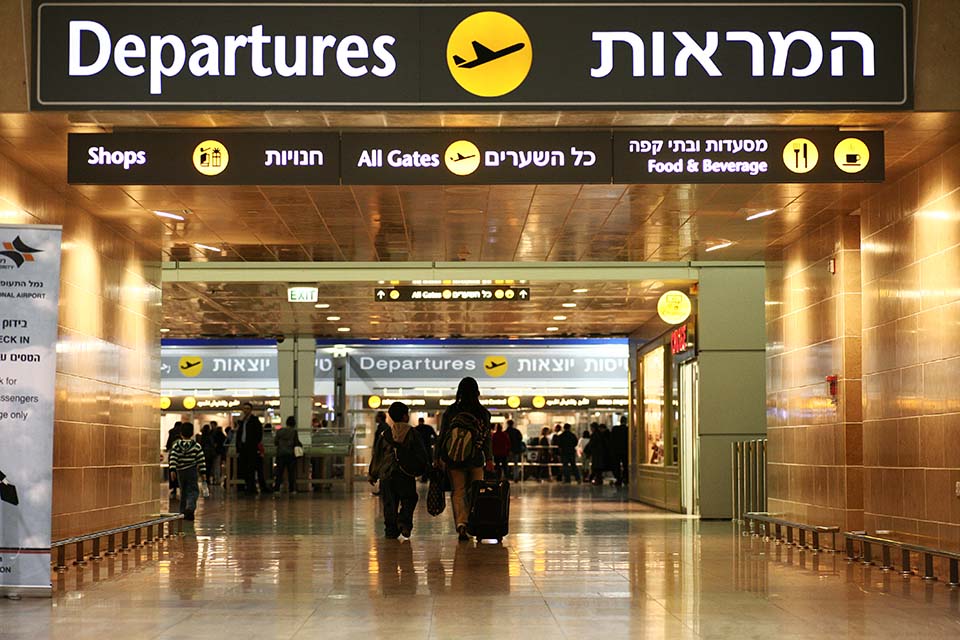 All contents © copyright Amos Roger. 2024 All rights reserved
All contents © copyright Amos Roger. 2024 All rights reservedIsraeli Passport
Marife Adriano, A Project About the Philippine Foreign Workers in Israel
The project documents the fascinating story of Marife Adriano, who has been living in Israel as an illegal foreign worker for the past 14 years. Only recently has she received the status of a temporary resident. This status has enabled her, for the first time in years, to return for a visit to the Philippines and meet those she left behind. I accompanied her during her first correspondences with the Ministry of Interior, all through receiving her residency status as well as her visit to her homeland. Through Marife's story we get a unique glimpse to the world of Philippine immigrant workers in Israel. Her intriguing personal story embodies compassion, warmth, courage and leadership.
This body of photography allows us to see the people who live around us every day, caring for our parents, cleaning our houses. To us, they are transparent, invisible even. This photography project invites you to discover a hidden world that lies within each and every one of us.
This phenomenon of labor migration is a universal phenomenon, part of the globalization process which characterizes the modern world. During the first Intifada in the 1990's, the State of Israel began importing foreign workers from third world countries in order to fill the void in the labor market. Filipinos were the first foreign workers to come to Israel, a migration which has lasted to this day, and as a result the Philippine community is one of the largest and oldest within the foreign worker community. There are about 50,000 Philippine foreign workers in Israel, mostly women who come to work in nursing. Many of them stay in Israel beyond their authorized visas and have children, thus becoming illegal aliens.
In 1995 Marife, mother to 3 year old Kevin, had been working in the Philippines as a manual laborer in a textile factory. From this type of job, her monthly salary amounted to 50 dollars. This salary could not enable her to make a respectable living. In order to allow a better life for her family, she went to work in Israel, leaving her son behind with her parents.
In her early days in Israel she found jobs through an agency located on Allenby St. in Tel-Aviv. After several years, Marife decided to leave the agency and rented an apartment in South Tel-Aviv. She earned her living by cleaning houses and stairways.
Seven years ago, Marife gave birth to a son named Adwin, from an affair she had with a Filipino man who had also been working in Israel. That man returned to the Philippines shortly after his son was born, and since then there has been no contact with him. As an infant, Adwin stayed at a foreign worker day-care near the New Central Bus Station in Tel-Aviv. He'd spend each day at the day-care until 7 pm – when Marife finished her work. At age 6 he began studying at Bialik-Rogozin School in Tel-Aviv. At the same time, in order to acclimatize in Israel, Marife began learning Hebrew in an Evening Ulpan at that same school. Despite the difficulty of raising a child in a foreign country, she always made sure to send a large part of her salary to her family in the Philippines.
In 2005 the State of Israel decided to approve a one-time gesture of granting 900 foreign worker children a status of permanent residency. The criteria for receiving this status required that each child be born in Israel and had been living in Israel for over 6 years. This way, thanks to Adwin, Marife was given a certificate and in July 2008 both she and Adwin left the Ministry of Interior with Identity Cards as well as a permanent residency license which must be renewed every year.
Thanks to this new status, Marife could finally visit her family. On December 2008 she flew with Adwin to the Philippines. There, she met for the first time in 14 years, her 17 year old son Kevin – who now studies Electrical Engineering at the University. These studies were made possible by the money his mother had sent all those years. In addition, the family house had been renovated and their standard of living had improved.
These days Marife lives with Adwin in Tel-Aviv. Her dream is to become an equal citizen in the State of Israel. This photography project took place over a year and a half: from December 2007 to May 2009.
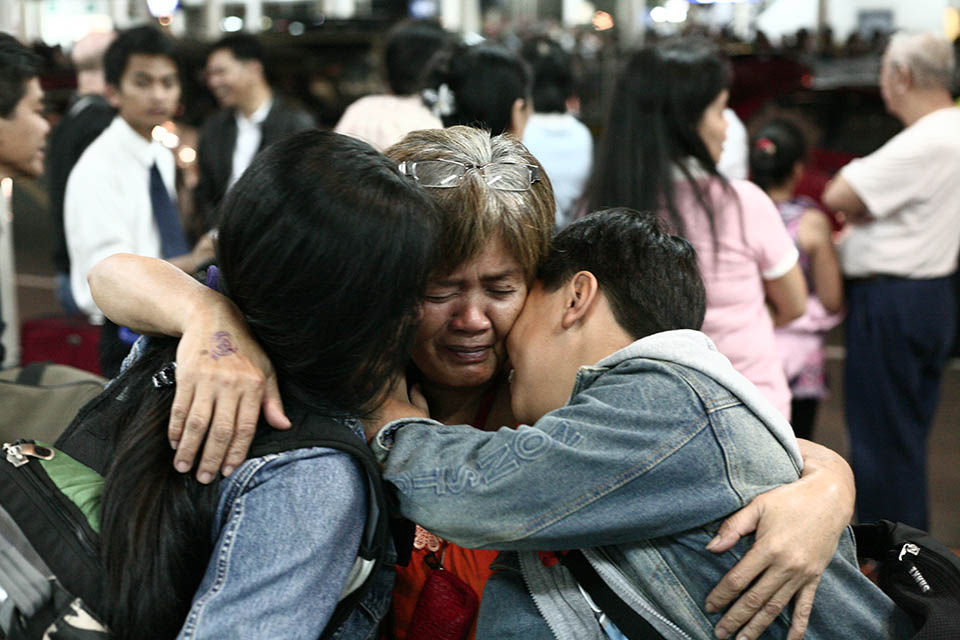 All contents © copyright Amos Roger. 2024 All rights reserved
All contents © copyright Amos Roger. 2024 All rights reservedIsraeli Passport
Marife Adriano, A Project About the Philippine Foreign Workers in Israel
The project documents the fascinating story of Marife Adriano, who has been living in Israel as an illegal foreign worker for the past 14 years. Only recently has she received the status of a temporary resident. This status has enabled her, for the first time in years, to return for a visit to the Philippines and meet those she left behind. I accompanied her during her first correspondences with the Ministry of Interior, all through receiving her residency status as well as her visit to her homeland. Through Marife's story we get a unique glimpse to the world of Philippine immigrant workers in Israel. Her intriguing personal story embodies compassion, warmth, courage and leadership.
This body of photography allows us to see the people who live around us every day, caring for our parents, cleaning our houses. To us, they are transparent, invisible even. This photography project invites you to discover a hidden world that lies within each and every one of us.
This phenomenon of labor migration is a universal phenomenon, part of the globalization process which characterizes the modern world. During the first Intifada in the 1990's, the State of Israel began importing foreign workers from third world countries in order to fill the void in the labor market. Filipinos were the first foreign workers to come to Israel, a migration which has lasted to this day, and as a result the Philippine community is one of the largest and oldest within the foreign worker community. There are about 50,000 Philippine foreign workers in Israel, mostly women who come to work in nursing. Many of them stay in Israel beyond their authorized visas and have children, thus becoming illegal aliens.
In 1995 Marife, mother to 3 year old Kevin, had been working in the Philippines as a manual laborer in a textile factory. From this type of job, her monthly salary amounted to 50 dollars. This salary could not enable her to make a respectable living. In order to allow a better life for her family, she went to work in Israel, leaving her son behind with her parents.
In her early days in Israel she found jobs through an agency located on Allenby St. in Tel-Aviv. After several years, Marife decided to leave the agency and rented an apartment in South Tel-Aviv. She earned her living by cleaning houses and stairways.
Seven years ago, Marife gave birth to a son named Adwin, from an affair she had with a Filipino man who had also been working in Israel. That man returned to the Philippines shortly after his son was born, and since then there has been no contact with him. As an infant, Adwin stayed at a foreign worker day-care near the New Central Bus Station in Tel-Aviv. He'd spend each day at the day-care until 7 pm – when Marife finished her work. At age 6 he began studying at Bialik-Rogozin School in Tel-Aviv. At the same time, in order to acclimatize in Israel, Marife began learning Hebrew in an Evening Ulpan at that same school. Despite the difficulty of raising a child in a foreign country, she always made sure to send a large part of her salary to her family in the Philippines.
In 2005 the State of Israel decided to approve a one-time gesture of granting 900 foreign worker children a status of permanent residency. The criteria for receiving this status required that each child be born in Israel and had been living in Israel for over 6 years. This way, thanks to Adwin, Marife was given a certificate and in July 2008 both she and Adwin left the Ministry of Interior with Identity Cards as well as a permanent residency license which must be renewed every year.
Thanks to this new status, Marife could finally visit her family. On December 2008 she flew with Adwin to the Philippines. There, she met for the first time in 14 years, her 17 year old son Kevin – who now studies Electrical Engineering at the University. These studies were made possible by the money his mother had sent all those years. In addition, the family house had been renovated and their standard of living had improved.
These days Marife lives with Adwin in Tel-Aviv. Her dream is to become an equal citizen in the State of Israel. This photography project took place over a year and a half: from December 2007 to May 2009.
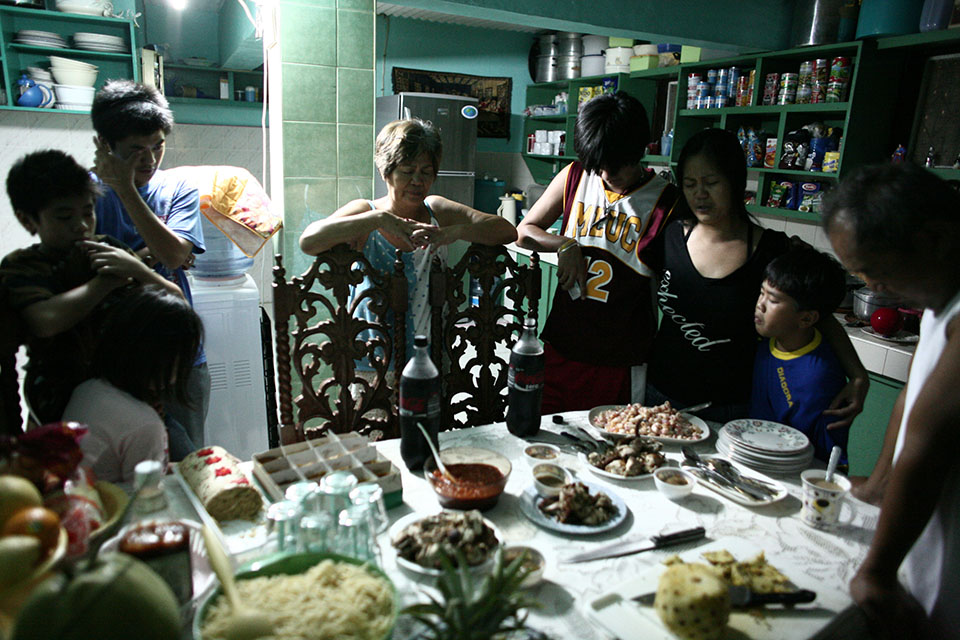 All contents © copyright Amos Roger. 2024 All rights reserved
All contents © copyright Amos Roger. 2024 All rights reservedIsraeli Passport
Marife Adriano, A Project About the Philippine Foreign Workers in Israel
The project documents the fascinating story of Marife Adriano, who has been living in Israel as an illegal foreign worker for the past 14 years. Only recently has she received the status of a temporary resident. This status has enabled her, for the first time in years, to return for a visit to the Philippines and meet those she left behind. I accompanied her during her first correspondences with the Ministry of Interior, all through receiving her residency status as well as her visit to her homeland. Through Marife's story we get a unique glimpse to the world of Philippine immigrant workers in Israel. Her intriguing personal story embodies compassion, warmth, courage and leadership.
This body of photography allows us to see the people who live around us every day, caring for our parents, cleaning our houses. To us, they are transparent, invisible even. This photography project invites you to discover a hidden world that lies within each and every one of us.
This phenomenon of labor migration is a universal phenomenon, part of the globalization process which characterizes the modern world. During the first Intifada in the 1990's, the State of Israel began importing foreign workers from third world countries in order to fill the void in the labor market. Filipinos were the first foreign workers to come to Israel, a migration which has lasted to this day, and as a result the Philippine community is one of the largest and oldest within the foreign worker community. There are about 50,000 Philippine foreign workers in Israel, mostly women who come to work in nursing. Many of them stay in Israel beyond their authorized visas and have children, thus becoming illegal aliens.
In 1995 Marife, mother to 3 year old Kevin, had been working in the Philippines as a manual laborer in a textile factory. From this type of job, her monthly salary amounted to 50 dollars. This salary could not enable her to make a respectable living. In order to allow a better life for her family, she went to work in Israel, leaving her son behind with her parents.
In her early days in Israel she found jobs through an agency located on Allenby St. in Tel-Aviv. After several years, Marife decided to leave the agency and rented an apartment in South Tel-Aviv. She earned her living by cleaning houses and stairways.
Seven years ago, Marife gave birth to a son named Adwin, from an affair she had with a Filipino man who had also been working in Israel. That man returned to the Philippines shortly after his son was born, and since then there has been no contact with him. As an infant, Adwin stayed at a foreign worker day-care near the New Central Bus Station in Tel-Aviv. He'd spend each day at the day-care until 7 pm – when Marife finished her work. At age 6 he began studying at Bialik-Rogozin School in Tel-Aviv. At the same time, in order to acclimatize in Israel, Marife began learning Hebrew in an Evening Ulpan at that same school. Despite the difficulty of raising a child in a foreign country, she always made sure to send a large part of her salary to her family in the Philippines.
In 2005 the State of Israel decided to approve a one-time gesture of granting 900 foreign worker children a status of permanent residency. The criteria for receiving this status required that each child be born in Israel and had been living in Israel for over 6 years. This way, thanks to Adwin, Marife was given a certificate and in July 2008 both she and Adwin left the Ministry of Interior with Identity Cards as well as a permanent residency license which must be renewed every year.
Thanks to this new status, Marife could finally visit her family. On December 2008 she flew with Adwin to the Philippines. There, she met for the first time in 14 years, her 17 year old son Kevin – who now studies Electrical Engineering at the University. These studies were made possible by the money his mother had sent all those years. In addition, the family house had been renovated and their standard of living had improved.
These days Marife lives with Adwin in Tel-Aviv. Her dream is to become an equal citizen in the State of Israel. This photography project took place over a year and a half: from December 2007 to May 2009.
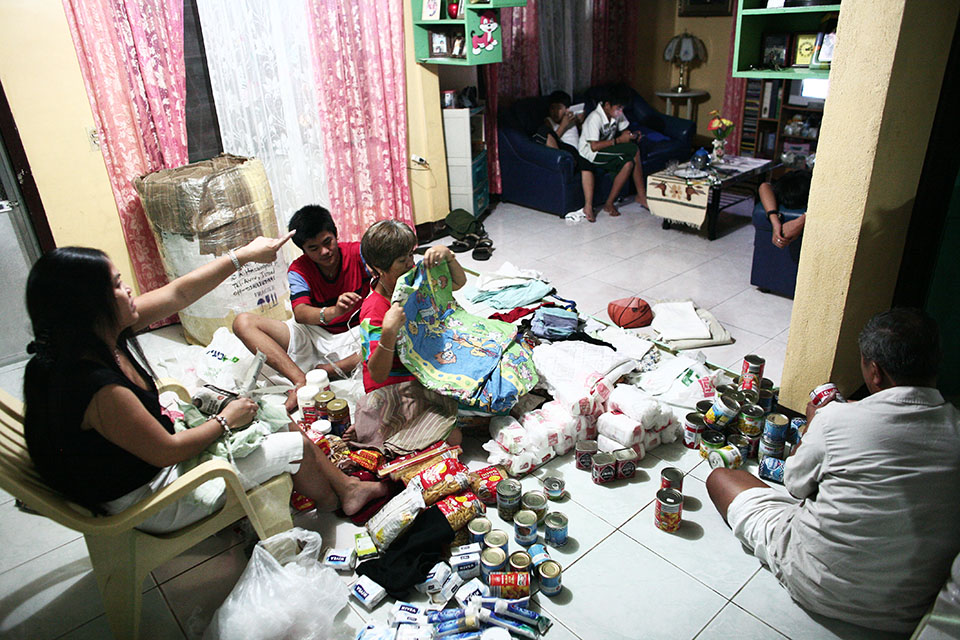 All contents © copyright Amos Roger. 2024 All rights reserved
All contents © copyright Amos Roger. 2024 All rights reservedIsraeli Passport
Marife Adriano, A Project About the Philippine Foreign Workers in Israel
The project documents the fascinating story of Marife Adriano, who has been living in Israel as an illegal foreign worker for the past 14 years. Only recently has she received the status of a temporary resident. This status has enabled her, for the first time in years, to return for a visit to the Philippines and meet those she left behind. I accompanied her during her first correspondences with the Ministry of Interior, all through receiving her residency status as well as her visit to her homeland. Through Marife's story we get a unique glimpse to the world of Philippine immigrant workers in Israel. Her intriguing personal story embodies compassion, warmth, courage and leadership.
This body of photography allows us to see the people who live around us every day, caring for our parents, cleaning our houses. To us, they are transparent, invisible even. This photography project invites you to discover a hidden world that lies within each and every one of us.
This phenomenon of labor migration is a universal phenomenon, part of the globalization process which characterizes the modern world. During the first Intifada in the 1990's, the State of Israel began importing foreign workers from third world countries in order to fill the void in the labor market. Filipinos were the first foreign workers to come to Israel, a migration which has lasted to this day, and as a result the Philippine community is one of the largest and oldest within the foreign worker community. There are about 50,000 Philippine foreign workers in Israel, mostly women who come to work in nursing. Many of them stay in Israel beyond their authorized visas and have children, thus becoming illegal aliens.
In 1995 Marife, mother to 3 year old Kevin, had been working in the Philippines as a manual laborer in a textile factory. From this type of job, her monthly salary amounted to 50 dollars. This salary could not enable her to make a respectable living. In order to allow a better life for her family, she went to work in Israel, leaving her son behind with her parents.
In her early days in Israel she found jobs through an agency located on Allenby St. in Tel-Aviv. After several years, Marife decided to leave the agency and rented an apartment in South Tel-Aviv. She earned her living by cleaning houses and stairways.
Seven years ago, Marife gave birth to a son named Adwin, from an affair she had with a Filipino man who had also been working in Israel. That man returned to the Philippines shortly after his son was born, and since then there has been no contact with him. As an infant, Adwin stayed at a foreign worker day-care near the New Central Bus Station in Tel-Aviv. He'd spend each day at the day-care until 7 pm – when Marife finished her work. At age 6 he began studying at Bialik-Rogozin School in Tel-Aviv. At the same time, in order to acclimatize in Israel, Marife began learning Hebrew in an Evening Ulpan at that same school. Despite the difficulty of raising a child in a foreign country, she always made sure to send a large part of her salary to her family in the Philippines.
In 2005 the State of Israel decided to approve a one-time gesture of granting 900 foreign worker children a status of permanent residency. The criteria for receiving this status required that each child be born in Israel and had been living in Israel for over 6 years. This way, thanks to Adwin, Marife was given a certificate and in July 2008 both she and Adwin left the Ministry of Interior with Identity Cards as well as a permanent residency license which must be renewed every year.
Thanks to this new status, Marife could finally visit her family. On December 2008 she flew with Adwin to the Philippines. There, she met for the first time in 14 years, her 17 year old son Kevin – who now studies Electrical Engineering at the University. These studies were made possible by the money his mother had sent all those years. In addition, the family house had been renovated and their standard of living had improved.
These days Marife lives with Adwin in Tel-Aviv. Her dream is to become an equal citizen in the State of Israel. This photography project took place over a year and a half: from December 2007 to May 2009.
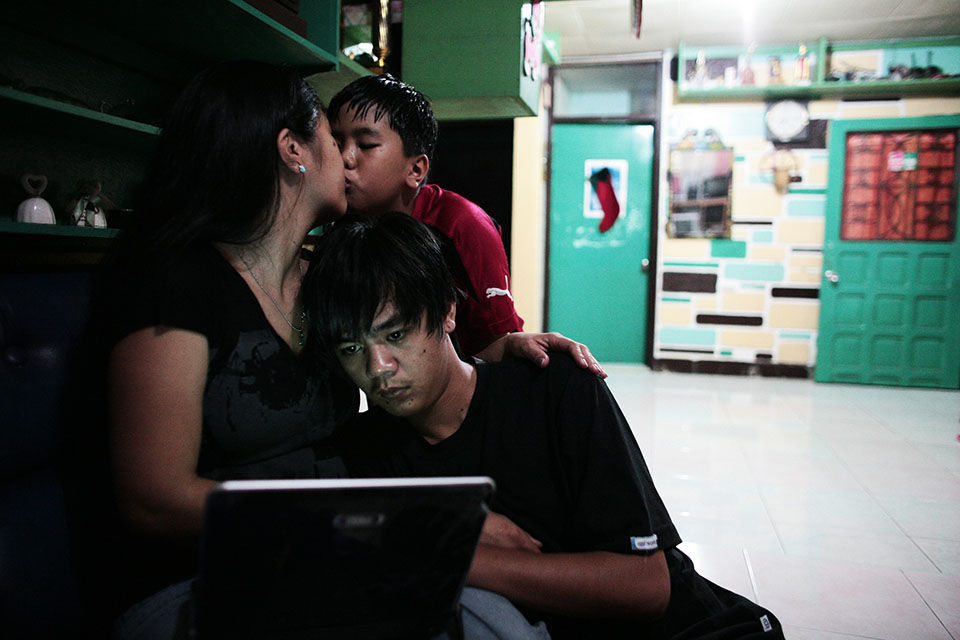 All contents © copyright Amos Roger. 2024 All rights reserved
All contents © copyright Amos Roger. 2024 All rights reservedIsraeli Passport
Marife Adriano, A Project About the Philippine Foreign Workers in Israel
The project documents the fascinating story of Marife Adriano, who has been living in Israel as an illegal foreign worker for the past 14 years. Only recently has she received the status of a temporary resident. This status has enabled her, for the first time in years, to return for a visit to the Philippines and meet those she left behind. I accompanied her during her first correspondences with the Ministry of Interior, all through receiving her residency status as well as her visit to her homeland. Through Marife's story we get a unique glimpse to the world of Philippine immigrant workers in Israel. Her intriguing personal story embodies compassion, warmth, courage and leadership.
This body of photography allows us to see the people who live around us every day, caring for our parents, cleaning our houses. To us, they are transparent, invisible even. This photography project invites you to discover a hidden world that lies within each and every one of us.
This phenomenon of labor migration is a universal phenomenon, part of the globalization process which characterizes the modern world. During the first Intifada in the 1990's, the State of Israel began importing foreign workers from third world countries in order to fill the void in the labor market. Filipinos were the first foreign workers to come to Israel, a migration which has lasted to this day, and as a result the Philippine community is one of the largest and oldest within the foreign worker community. There are about 50,000 Philippine foreign workers in Israel, mostly women who come to work in nursing. Many of them stay in Israel beyond their authorized visas and have children, thus becoming illegal aliens.
In 1995 Marife, mother to 3 year old Kevin, had been working in the Philippines as a manual laborer in a textile factory. From this type of job, her monthly salary amounted to 50 dollars. This salary could not enable her to make a respectable living. In order to allow a better life for her family, she went to work in Israel, leaving her son behind with her parents.
In her early days in Israel she found jobs through an agency located on Allenby St. in Tel-Aviv. After several years, Marife decided to leave the agency and rented an apartment in South Tel-Aviv. She earned her living by cleaning houses and stairways.
Seven years ago, Marife gave birth to a son named Adwin, from an affair she had with a Filipino man who had also been working in Israel. That man returned to the Philippines shortly after his son was born, and since then there has been no contact with him. As an infant, Adwin stayed at a foreign worker day-care near the New Central Bus Station in Tel-Aviv. He'd spend each day at the day-care until 7 pm – when Marife finished her work. At age 6 he began studying at Bialik-Rogozin School in Tel-Aviv. At the same time, in order to acclimatize in Israel, Marife began learning Hebrew in an Evening Ulpan at that same school. Despite the difficulty of raising a child in a foreign country, she always made sure to send a large part of her salary to her family in the Philippines.
In 2005 the State of Israel decided to approve a one-time gesture of granting 900 foreign worker children a status of permanent residency. The criteria for receiving this status required that each child be born in Israel and had been living in Israel for over 6 years. This way, thanks to Adwin, Marife was given a certificate and in July 2008 both she and Adwin left the Ministry of Interior with Identity Cards as well as a permanent residency license which must be renewed every year.
Thanks to this new status, Marife could finally visit her family. On December 2008 she flew with Adwin to the Philippines. There, she met for the first time in 14 years, her 17 year old son Kevin – who now studies Electrical Engineering at the University. These studies were made possible by the money his mother had sent all those years. In addition, the family house had been renovated and their standard of living had improved.
These days Marife lives with Adwin in Tel-Aviv. Her dream is to become an equal citizen in the State of Israel. This photography project took place over a year and a half: from December 2007 to May 2009.
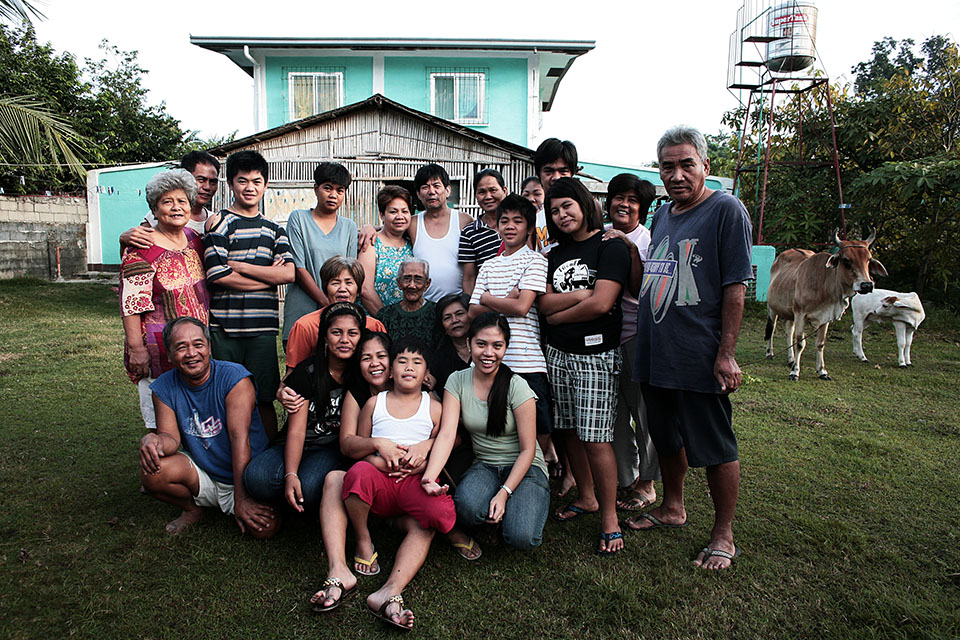 All contents © copyright Amos Roger. 2024 All rights reserved
All contents © copyright Amos Roger. 2024 All rights reservedIsraeli Passport
Marife Adriano, A Project About the Philippine Foreign Workers in Israel
The project documents the fascinating story of Marife Adriano, who has been living in Israel as an illegal foreign worker for the past 14 years. Only recently has she received the status of a temporary resident. This status has enabled her, for the first time in years, to return for a visit to the Philippines and meet those she left behind. I accompanied her during her first correspondences with the Ministry of Interior, all through receiving her residency status as well as her visit to her homeland. Through Marife's story we get a unique glimpse to the world of Philippine immigrant workers in Israel. Her intriguing personal story embodies compassion, warmth, courage and leadership.
This body of photography allows us to see the people who live around us every day, caring for our parents, cleaning our houses. To us, they are transparent, invisible even. This photography project invites you to discover a hidden world that lies within each and every one of us.
This phenomenon of labor migration is a universal phenomenon, part of the globalization process which characterizes the modern world. During the first Intifada in the 1990's, the State of Israel began importing foreign workers from third world countries in order to fill the void in the labor market. Filipinos were the first foreign workers to come to Israel, a migration which has lasted to this day, and as a result the Philippine community is one of the largest and oldest within the foreign worker community. There are about 50,000 Philippine foreign workers in Israel, mostly women who come to work in nursing. Many of them stay in Israel beyond their authorized visas and have children, thus becoming illegal aliens.
In 1995 Marife, mother to 3 year old Kevin, had been working in the Philippines as a manual laborer in a textile factory. From this type of job, her monthly salary amounted to 50 dollars. This salary could not enable her to make a respectable living. In order to allow a better life for her family, she went to work in Israel, leaving her son behind with her parents.
In her early days in Israel she found jobs through an agency located on Allenby St. in Tel-Aviv. After several years, Marife decided to leave the agency and rented an apartment in South Tel-Aviv. She earned her living by cleaning houses and stairways.
Seven years ago, Marife gave birth to a son named Adwin, from an affair she had with a Filipino man who had also been working in Israel. That man returned to the Philippines shortly after his son was born, and since then there has been no contact with him. As an infant, Adwin stayed at a foreign worker day-care near the New Central Bus Station in Tel-Aviv. He'd spend each day at the day-care until 7 pm – when Marife finished her work. At age 6 he began studying at Bialik-Rogozin School in Tel-Aviv. At the same time, in order to acclimatize in Israel, Marife began learning Hebrew in an Evening Ulpan at that same school. Despite the difficulty of raising a child in a foreign country, she always made sure to send a large part of her salary to her family in the Philippines.
In 2005 the State of Israel decided to approve a one-time gesture of granting 900 foreign worker children a status of permanent residency. The criteria for receiving this status required that each child be born in Israel and had been living in Israel for over 6 years. This way, thanks to Adwin, Marife was given a certificate and in July 2008 both she and Adwin left the Ministry of Interior with Identity Cards as well as a permanent residency license which must be renewed every year.
Thanks to this new status, Marife could finally visit her family. On December 2008 she flew with Adwin to the Philippines. There, she met for the first time in 14 years, her 17 year old son Kevin – who now studies Electrical Engineering at the University. These studies were made possible by the money his mother had sent all those years. In addition, the family house had been renovated and their standard of living had improved.
These days Marife lives with Adwin in Tel-Aviv. Her dream is to become an equal citizen in the State of Israel. This photography project took place over a year and a half: from December 2007 to May 2009.
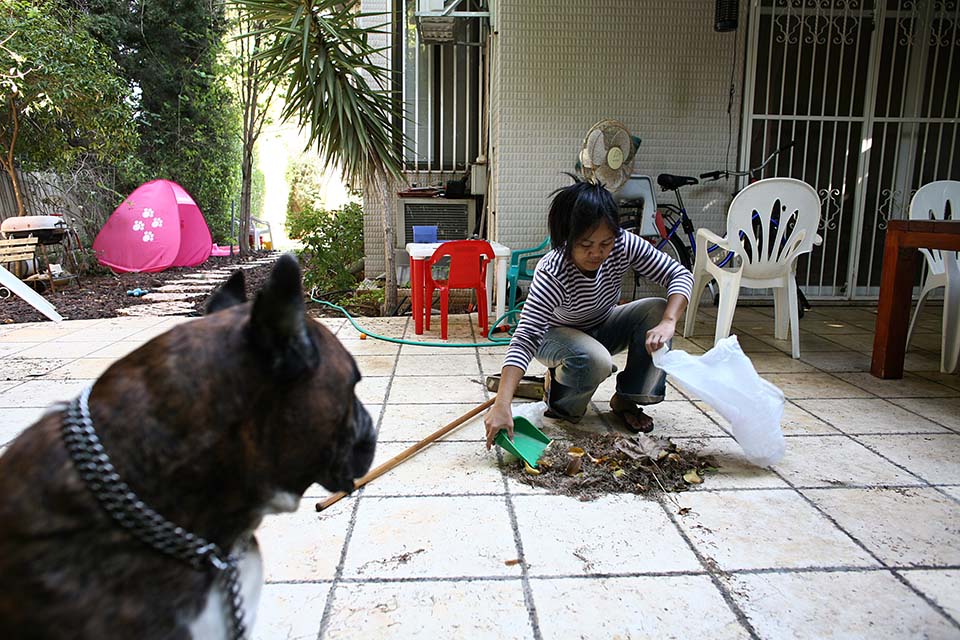 All contents © copyright Amos Roger. 2024 All rights reserved
All contents © copyright Amos Roger. 2024 All rights reservedIsraeli Passport
Marife Adriano, A Project About the Philippine Foreign Workers in Israel
The project documents the fascinating story of Marife Adriano, who has been living in Israel as an illegal foreign worker for the past 14 years. Only recently has she received the status of a temporary resident. This status has enabled her, for the first time in years, to return for a visit to the Philippines and meet those she left behind. I accompanied her during her first correspondences with the Ministry of Interior, all through receiving her residency status as well as her visit to her homeland. Through Marife's story we get a unique glimpse to the world of Philippine immigrant workers in Israel. Her intriguing personal story embodies compassion, warmth, courage and leadership.
This body of photography allows us to see the people who live around us every day, caring for our parents, cleaning our houses. To us, they are transparent, invisible even. This photography project invites you to discover a hidden world that lies within each and every one of us.
This phenomenon of labor migration is a universal phenomenon, part of the globalization process which characterizes the modern world. During the first Intifada in the 1990's, the State of Israel began importing foreign workers from third world countries in order to fill the void in the labor market. Filipinos were the first foreign workers to come to Israel, a migration which has lasted to this day, and as a result the Philippine community is one of the largest and oldest within the foreign worker community. There are about 50,000 Philippine foreign workers in Israel, mostly women who come to work in nursing. Many of them stay in Israel beyond their authorized visas and have children, thus becoming illegal aliens.
In 1995 Marife, mother to 3 year old Kevin, had been working in the Philippines as a manual laborer in a textile factory. From this type of job, her monthly salary amounted to 50 dollars. This salary could not enable her to make a respectable living. In order to allow a better life for her family, she went to work in Israel, leaving her son behind with her parents.
In her early days in Israel she found jobs through an agency located on Allenby St. in Tel-Aviv. After several years, Marife decided to leave the agency and rented an apartment in South Tel-Aviv. She earned her living by cleaning houses and stairways.
Seven years ago, Marife gave birth to a son named Adwin, from an affair she had with a Filipino man who had also been working in Israel. That man returned to the Philippines shortly after his son was born, and since then there has been no contact with him. As an infant, Adwin stayed at a foreign worker day-care near the New Central Bus Station in Tel-Aviv. He'd spend each day at the day-care until 7 pm – when Marife finished her work. At age 6 he began studying at Bialik-Rogozin School in Tel-Aviv. At the same time, in order to acclimatize in Israel, Marife began learning Hebrew in an Evening Ulpan at that same school. Despite the difficulty of raising a child in a foreign country, she always made sure to send a large part of her salary to her family in the Philippines.
In 2005 the State of Israel decided to approve a one-time gesture of granting 900 foreign worker children a status of permanent residency. The criteria for receiving this status required that each child be born in Israel and had been living in Israel for over 6 years. This way, thanks to Adwin, Marife was given a certificate and in July 2008 both she and Adwin left the Ministry of Interior with Identity Cards as well as a permanent residency license which must be renewed every year.
Thanks to this new status, Marife could finally visit her family. On December 2008 she flew with Adwin to the Philippines. There, she met for the first time in 14 years, her 17 year old son Kevin – who now studies Electrical Engineering at the University. These studies were made possible by the money his mother had sent all those years. In addition, the family house had been renovated and their standard of living had improved.
These days Marife lives with Adwin in Tel-Aviv. Her dream is to become an equal citizen in the State of Israel. This photography project took place over a year and a half: from December 2007 to May 2009.
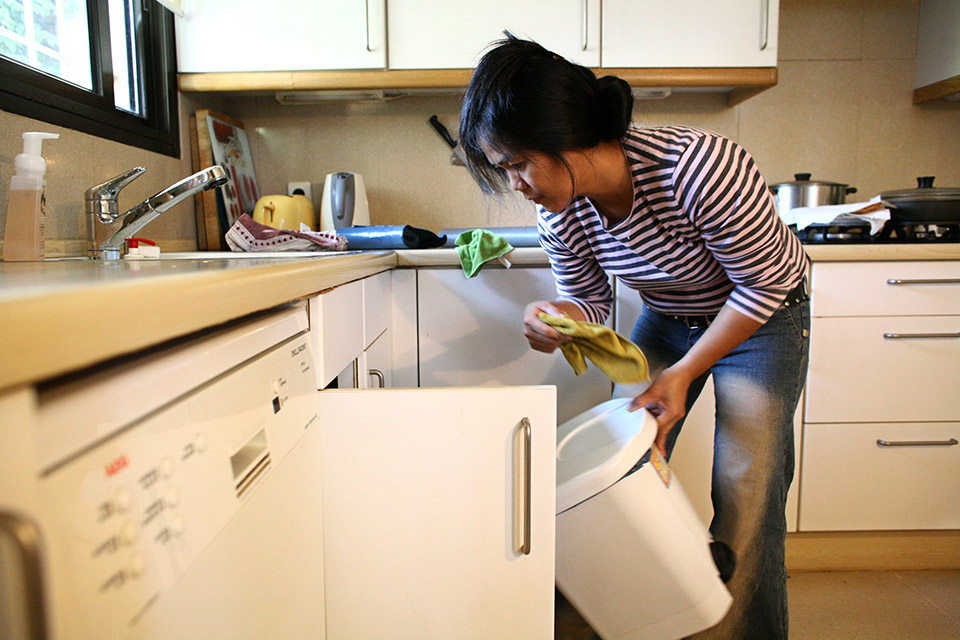 All contents © copyright Amos Roger. 2024 All rights reserved
All contents © copyright Amos Roger. 2024 All rights reservedIsraeli Passport
Marife Adriano, A Project About the Philippine Foreign Workers in Israel
The project documents the fascinating story of Marife Adriano, who has been living in Israel as an illegal foreign worker for the past 14 years. Only recently has she received the status of a temporary resident. This status has enabled her, for the first time in years, to return for a visit to the Philippines and meet those she left behind. I accompanied her during her first correspondences with the Ministry of Interior, all through receiving her residency status as well as her visit to her homeland. Through Marife's story we get a unique glimpse to the world of Philippine immigrant workers in Israel. Her intriguing personal story embodies compassion, warmth, courage and leadership.
This body of photography allows us to see the people who live around us every day, caring for our parents, cleaning our houses. To us, they are transparent, invisible even. This photography project invites you to discover a hidden world that lies within each and every one of us.
This phenomenon of labor migration is a universal phenomenon, part of the globalization process which characterizes the modern world. During the first Intifada in the 1990's, the State of Israel began importing foreign workers from third world countries in order to fill the void in the labor market. Filipinos were the first foreign workers to come to Israel, a migration which has lasted to this day, and as a result the Philippine community is one of the largest and oldest within the foreign worker community. There are about 50,000 Philippine foreign workers in Israel, mostly women who come to work in nursing. Many of them stay in Israel beyond their authorized visas and have children, thus becoming illegal aliens.
In 1995 Marife, mother to 3 year old Kevin, had been working in the Philippines as a manual laborer in a textile factory. From this type of job, her monthly salary amounted to 50 dollars. This salary could not enable her to make a respectable living. In order to allow a better life for her family, she went to work in Israel, leaving her son behind with her parents.
In her early days in Israel she found jobs through an agency located on Allenby St. in Tel-Aviv. After several years, Marife decided to leave the agency and rented an apartment in South Tel-Aviv. She earned her living by cleaning houses and stairways.
Seven years ago, Marife gave birth to a son named Adwin, from an affair she had with a Filipino man who had also been working in Israel. That man returned to the Philippines shortly after his son was born, and since then there has been no contact with him. As an infant, Adwin stayed at a foreign worker day-care near the New Central Bus Station in Tel-Aviv. He'd spend each day at the day-care until 7 pm – when Marife finished her work. At age 6 he began studying at Bialik-Rogozin School in Tel-Aviv. At the same time, in order to acclimatize in Israel, Marife began learning Hebrew in an Evening Ulpan at that same school. Despite the difficulty of raising a child in a foreign country, she always made sure to send a large part of her salary to her family in the Philippines.
In 2005 the State of Israel decided to approve a one-time gesture of granting 900 foreign worker children a status of permanent residency. The criteria for receiving this status required that each child be born in Israel and had been living in Israel for over 6 years. This way, thanks to Adwin, Marife was given a certificate and in July 2008 both she and Adwin left the Ministry of Interior with Identity Cards as well as a permanent residency license which must be renewed every year.
Thanks to this new status, Marife could finally visit her family. On December 2008 she flew with Adwin to the Philippines. There, she met for the first time in 14 years, her 17 year old son Kevin – who now studies Electrical Engineering at the University. These studies were made possible by the money his mother had sent all those years. In addition, the family house had been renovated and their standard of living had improved.
These days Marife lives with Adwin in Tel-Aviv. Her dream is to become an equal citizen in the State of Israel. This photography project took place over a year and a half: from December 2007 to May 2009.
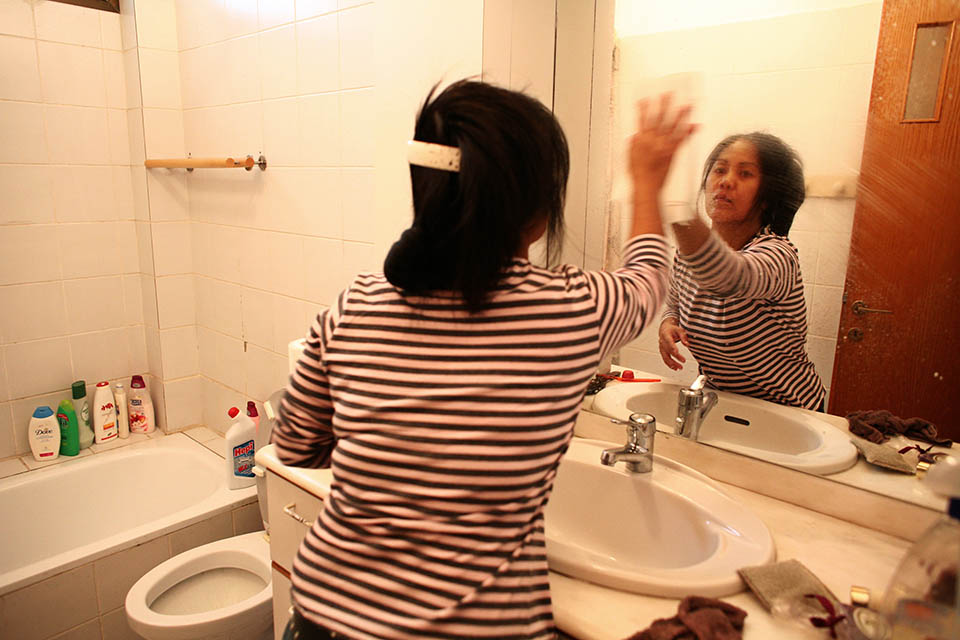 All contents © copyright Amos Roger. 2024 All rights reserved
All contents © copyright Amos Roger. 2024 All rights reservedIsraeli Passport
Marife Adriano, A Project About the Philippine Foreign Workers in Israel
The project documents the fascinating story of Marife Adriano, who has been living in Israel as an illegal foreign worker for the past 14 years. Only recently has she received the status of a temporary resident. This status has enabled her, for the first time in years, to return for a visit to the Philippines and meet those she left behind. I accompanied her during her first correspondences with the Ministry of Interior, all through receiving her residency status as well as her visit to her homeland. Through Marife's story we get a unique glimpse to the world of Philippine immigrant workers in Israel. Her intriguing personal story embodies compassion, warmth, courage and leadership.
This body of photography allows us to see the people who live around us every day, caring for our parents, cleaning our houses. To us, they are transparent, invisible even. This photography project invites you to discover a hidden world that lies within each and every one of us.
This phenomenon of labor migration is a universal phenomenon, part of the globalization process which characterizes the modern world. During the first Intifada in the 1990's, the State of Israel began importing foreign workers from third world countries in order to fill the void in the labor market. Filipinos were the first foreign workers to come to Israel, a migration which has lasted to this day, and as a result the Philippine community is one of the largest and oldest within the foreign worker community. There are about 50,000 Philippine foreign workers in Israel, mostly women who come to work in nursing. Many of them stay in Israel beyond their authorized visas and have children, thus becoming illegal aliens.
In 1995 Marife, mother to 3 year old Kevin, had been working in the Philippines as a manual laborer in a textile factory. From this type of job, her monthly salary amounted to 50 dollars. This salary could not enable her to make a respectable living. In order to allow a better life for her family, she went to work in Israel, leaving her son behind with her parents.
In her early days in Israel she found jobs through an agency located on Allenby St. in Tel-Aviv. After several years, Marife decided to leave the agency and rented an apartment in South Tel-Aviv. She earned her living by cleaning houses and stairways.
Seven years ago, Marife gave birth to a son named Adwin, from an affair she had with a Filipino man who had also been working in Israel. That man returned to the Philippines shortly after his son was born, and since then there has been no contact with him. As an infant, Adwin stayed at a foreign worker day-care near the New Central Bus Station in Tel-Aviv. He'd spend each day at the day-care until 7 pm – when Marife finished her work. At age 6 he began studying at Bialik-Rogozin School in Tel-Aviv. At the same time, in order to acclimatize in Israel, Marife began learning Hebrew in an Evening Ulpan at that same school. Despite the difficulty of raising a child in a foreign country, she always made sure to send a large part of her salary to her family in the Philippines.
In 2005 the State of Israel decided to approve a one-time gesture of granting 900 foreign worker children a status of permanent residency. The criteria for receiving this status required that each child be born in Israel and had been living in Israel for over 6 years. This way, thanks to Adwin, Marife was given a certificate and in July 2008 both she and Adwin left the Ministry of Interior with Identity Cards as well as a permanent residency license which must be renewed every year.
Thanks to this new status, Marife could finally visit her family. On December 2008 she flew with Adwin to the Philippines. There, she met for the first time in 14 years, her 17 year old son Kevin – who now studies Electrical Engineering at the University. These studies were made possible by the money his mother had sent all those years. In addition, the family house had been renovated and their standard of living had improved.
These days Marife lives with Adwin in Tel-Aviv. Her dream is to become an equal citizen in the State of Israel. This photography project took place over a year and a half: from December 2007 to May 2009.
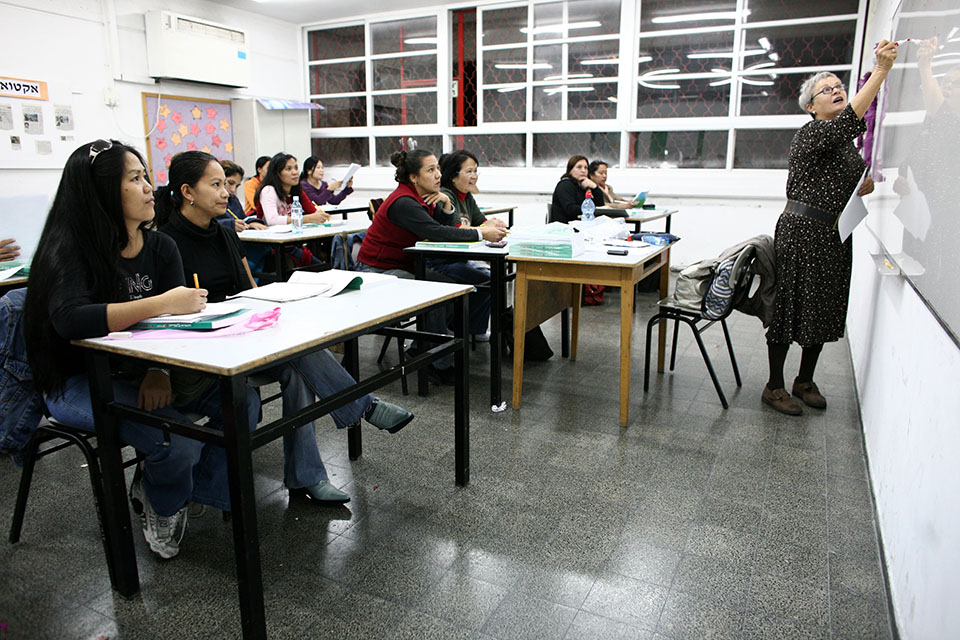 All contents © copyright Amos Roger. 2024 All rights reserved
All contents © copyright Amos Roger. 2024 All rights reservedIsraeli Passport
Marife Adriano, A Project About the Philippine Foreign Workers in Israel
The project documents the fascinating story of Marife Adriano, who has been living in Israel as an illegal foreign worker for the past 14 years. Only recently has she received the status of a temporary resident. This status has enabled her, for the first time in years, to return for a visit to the Philippines and meet those she left behind. I accompanied her during her first correspondences with the Ministry of Interior, all through receiving her residency status as well as her visit to her homeland. Through Marife's story we get a unique glimpse to the world of Philippine immigrant workers in Israel. Her intriguing personal story embodies compassion, warmth, courage and leadership.
This body of photography allows us to see the people who live around us every day, caring for our parents, cleaning our houses. To us, they are transparent, invisible even. This photography project invites you to discover a hidden world that lies within each and every one of us.
This phenomenon of labor migration is a universal phenomenon, part of the globalization process which characterizes the modern world. During the first Intifada in the 1990's, the State of Israel began importing foreign workers from third world countries in order to fill the void in the labor market. Filipinos were the first foreign workers to come to Israel, a migration which has lasted to this day, and as a result the Philippine community is one of the largest and oldest within the foreign worker community. There are about 50,000 Philippine foreign workers in Israel, mostly women who come to work in nursing. Many of them stay in Israel beyond their authorized visas and have children, thus becoming illegal aliens.
In 1995 Marife, mother to 3 year old Kevin, had been working in the Philippines as a manual laborer in a textile factory. From this type of job, her monthly salary amounted to 50 dollars. This salary could not enable her to make a respectable living. In order to allow a better life for her family, she went to work in Israel, leaving her son behind with her parents.
In her early days in Israel she found jobs through an agency located on Allenby St. in Tel-Aviv. After several years, Marife decided to leave the agency and rented an apartment in South Tel-Aviv. She earned her living by cleaning houses and stairways.
Seven years ago, Marife gave birth to a son named Adwin, from an affair she had with a Filipino man who had also been working in Israel. That man returned to the Philippines shortly after his son was born, and since then there has been no contact with him. As an infant, Adwin stayed at a foreign worker day-care near the New Central Bus Station in Tel-Aviv. He'd spend each day at the day-care until 7 pm – when Marife finished her work. At age 6 he began studying at Bialik-Rogozin School in Tel-Aviv. At the same time, in order to acclimatize in Israel, Marife began learning Hebrew in an Evening Ulpan at that same school. Despite the difficulty of raising a child in a foreign country, she always made sure to send a large part of her salary to her family in the Philippines.
In 2005 the State of Israel decided to approve a one-time gesture of granting 900 foreign worker children a status of permanent residency. The criteria for receiving this status required that each child be born in Israel and had been living in Israel for over 6 years. This way, thanks to Adwin, Marife was given a certificate and in July 2008 both she and Adwin left the Ministry of Interior with Identity Cards as well as a permanent residency license which must be renewed every year.
Thanks to this new status, Marife could finally visit her family. On December 2008 she flew with Adwin to the Philippines. There, she met for the first time in 14 years, her 17 year old son Kevin – who now studies Electrical Engineering at the University. These studies were made possible by the money his mother had sent all those years. In addition, the family house had been renovated and their standard of living had improved.
These days Marife lives with Adwin in Tel-Aviv. Her dream is to become an equal citizen in the State of Israel. This photography project took place over a year and a half: from December 2007 to May 2009.
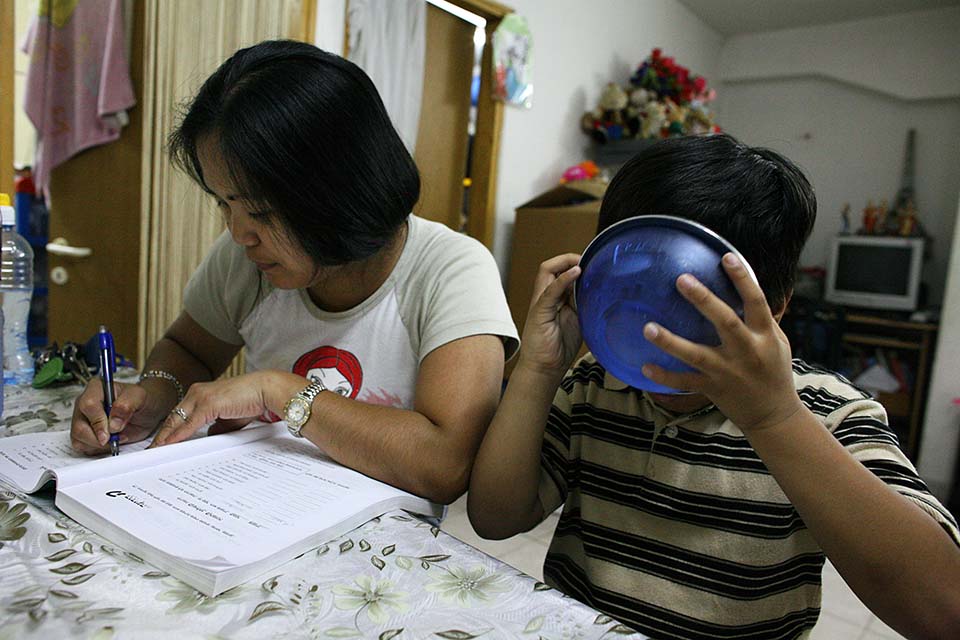 All contents © copyright Amos Roger. 2024 All rights reserved
All contents © copyright Amos Roger. 2024 All rights reservedIsraeli Passport
Marife Adriano, A Project About the Philippine Foreign Workers in Israel
The project documents the fascinating story of Marife Adriano, who has been living in Israel as an illegal foreign worker for the past 14 years. Only recently has she received the status of a temporary resident. This status has enabled her, for the first time in years, to return for a visit to the Philippines and meet those she left behind. I accompanied her during her first correspondences with the Ministry of Interior, all through receiving her residency status as well as her visit to her homeland. Through Marife's story we get a unique glimpse to the world of Philippine immigrant workers in Israel. Her intriguing personal story embodies compassion, warmth, courage and leadership.
This body of photography allows us to see the people who live around us every day, caring for our parents, cleaning our houses. To us, they are transparent, invisible even. This photography project invites you to discover a hidden world that lies within each and every one of us.
This phenomenon of labor migration is a universal phenomenon, part of the globalization process which characterizes the modern world. During the first Intifada in the 1990's, the State of Israel began importing foreign workers from third world countries in order to fill the void in the labor market. Filipinos were the first foreign workers to come to Israel, a migration which has lasted to this day, and as a result the Philippine community is one of the largest and oldest within the foreign worker community. There are about 50,000 Philippine foreign workers in Israel, mostly women who come to work in nursing. Many of them stay in Israel beyond their authorized visas and have children, thus becoming illegal aliens.
In 1995 Marife, mother to 3 year old Kevin, had been working in the Philippines as a manual laborer in a textile factory. From this type of job, her monthly salary amounted to 50 dollars. This salary could not enable her to make a respectable living. In order to allow a better life for her family, she went to work in Israel, leaving her son behind with her parents.
In her early days in Israel she found jobs through an agency located on Allenby St. in Tel-Aviv. After several years, Marife decided to leave the agency and rented an apartment in South Tel-Aviv. She earned her living by cleaning houses and stairways.
Seven years ago, Marife gave birth to a son named Adwin, from an affair she had with a Filipino man who had also been working in Israel. That man returned to the Philippines shortly after his son was born, and since then there has been no contact with him. As an infant, Adwin stayed at a foreign worker day-care near the New Central Bus Station in Tel-Aviv. He'd spend each day at the day-care until 7 pm – when Marife finished her work. At age 6 he began studying at Bialik-Rogozin School in Tel-Aviv. At the same time, in order to acclimatize in Israel, Marife began learning Hebrew in an Evening Ulpan at that same school. Despite the difficulty of raising a child in a foreign country, she always made sure to send a large part of her salary to her family in the Philippines.
In 2005 the State of Israel decided to approve a one-time gesture of granting 900 foreign worker children a status of permanent residency. The criteria for receiving this status required that each child be born in Israel and had been living in Israel for over 6 years. This way, thanks to Adwin, Marife was given a certificate and in July 2008 both she and Adwin left the Ministry of Interior with Identity Cards as well as a permanent residency license which must be renewed every year.
Thanks to this new status, Marife could finally visit her family. On December 2008 she flew with Adwin to the Philippines. There, she met for the first time in 14 years, her 17 year old son Kevin – who now studies Electrical Engineering at the University. These studies were made possible by the money his mother had sent all those years. In addition, the family house had been renovated and their standard of living had improved.
These days Marife lives with Adwin in Tel-Aviv. Her dream is to become an equal citizen in the State of Israel. This photography project took place over a year and a half: from December 2007 to May 2009.
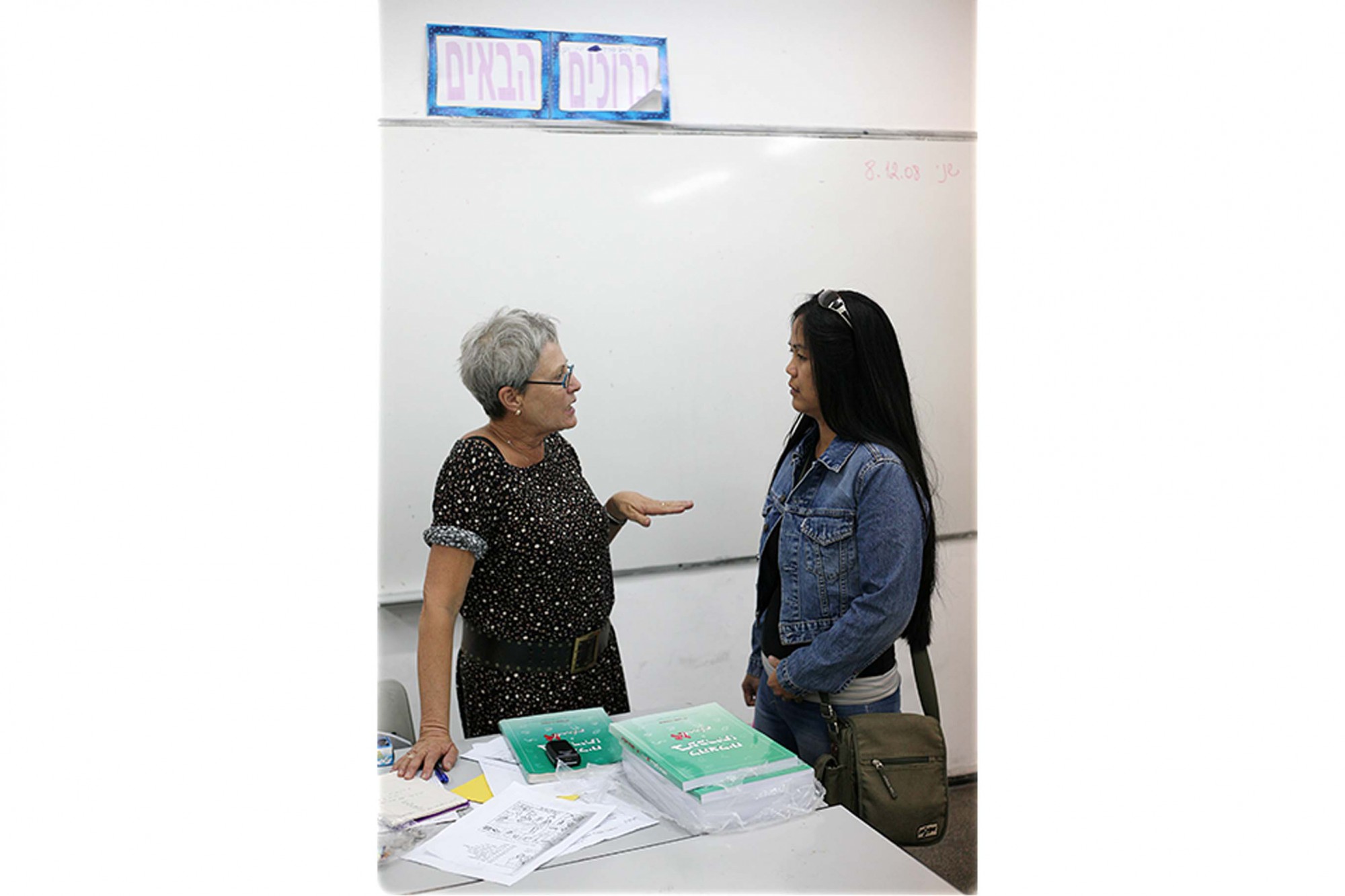 All contents © copyright Amos Roger. 2024 All rights reserved
All contents © copyright Amos Roger. 2024 All rights reservedIsraeli Passport
Marife Adriano, A Project About the Philippine Foreign Workers in Israel
The project documents the fascinating story of Marife Adriano, who has been living in Israel as an illegal foreign worker for the past 14 years. Only recently has she received the status of a temporary resident. This status has enabled her, for the first time in years, to return for a visit to the Philippines and meet those she left behind. I accompanied her during her first correspondences with the Ministry of Interior, all through receiving her residency status as well as her visit to her homeland. Through Marife's story we get a unique glimpse to the world of Philippine immigrant workers in Israel. Her intriguing personal story embodies compassion, warmth, courage and leadership.
This body of photography allows us to see the people who live around us every day, caring for our parents, cleaning our houses. To us, they are transparent, invisible even. This photography project invites you to discover a hidden world that lies within each and every one of us.
This phenomenon of labor migration is a universal phenomenon, part of the globalization process which characterizes the modern world. During the first Intifada in the 1990's, the State of Israel began importing foreign workers from third world countries in order to fill the void in the labor market. Filipinos were the first foreign workers to come to Israel, a migration which has lasted to this day, and as a result the Philippine community is one of the largest and oldest within the foreign worker community. There are about 50,000 Philippine foreign workers in Israel, mostly women who come to work in nursing. Many of them stay in Israel beyond their authorized visas and have children, thus becoming illegal aliens.
In 1995 Marife, mother to 3 year old Kevin, had been working in the Philippines as a manual laborer in a textile factory. From this type of job, her monthly salary amounted to 50 dollars. This salary could not enable her to make a respectable living. In order to allow a better life for her family, she went to work in Israel, leaving her son behind with her parents.
In her early days in Israel she found jobs through an agency located on Allenby St. in Tel-Aviv. After several years, Marife decided to leave the agency and rented an apartment in South Tel-Aviv. She earned her living by cleaning houses and stairways.
Seven years ago, Marife gave birth to a son named Adwin, from an affair she had with a Filipino man who had also been working in Israel. That man returned to the Philippines shortly after his son was born, and since then there has been no contact with him. As an infant, Adwin stayed at a foreign worker day-care near the New Central Bus Station in Tel-Aviv. He'd spend each day at the day-care until 7 pm – when Marife finished her work. At age 6 he began studying at Bialik-Rogozin School in Tel-Aviv. At the same time, in order to acclimatize in Israel, Marife began learning Hebrew in an Evening Ulpan at that same school. Despite the difficulty of raising a child in a foreign country, she always made sure to send a large part of her salary to her family in the Philippines.
In 2005 the State of Israel decided to approve a one-time gesture of granting 900 foreign worker children a status of permanent residency. The criteria for receiving this status required that each child be born in Israel and had been living in Israel for over 6 years. This way, thanks to Adwin, Marife was given a certificate and in July 2008 both she and Adwin left the Ministry of Interior with Identity Cards as well as a permanent residency license which must be renewed every year.
Thanks to this new status, Marife could finally visit her family. On December 2008 she flew with Adwin to the Philippines. There, she met for the first time in 14 years, her 17 year old son Kevin – who now studies Electrical Engineering at the University. These studies were made possible by the money his mother had sent all those years. In addition, the family house had been renovated and their standard of living had improved.
These days Marife lives with Adwin in Tel-Aviv. Her dream is to become an equal citizen in the State of Israel. This photography project took place over a year and a half: from December 2007 to May 2009.
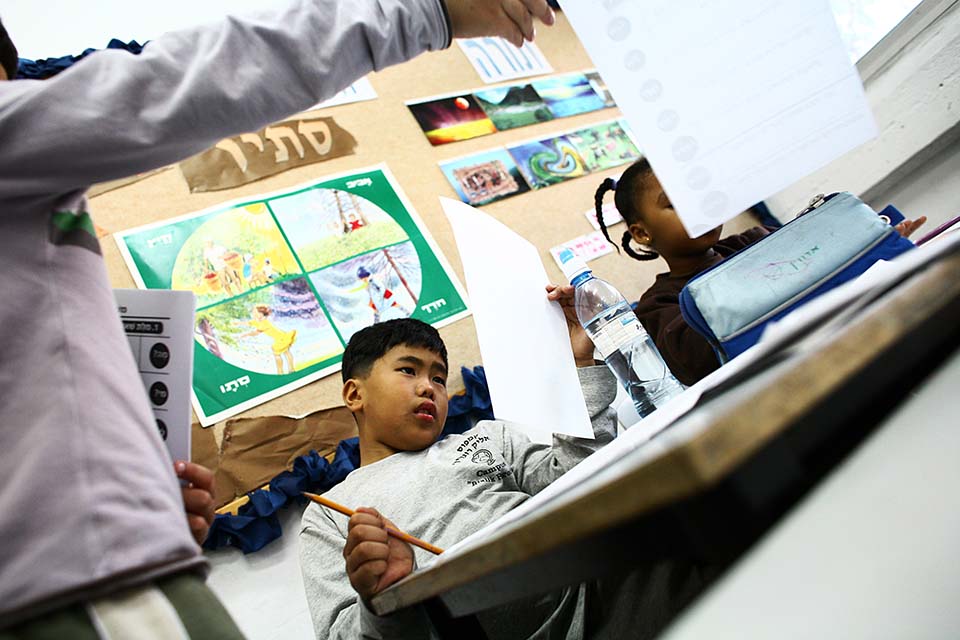 All contents © copyright Amos Roger. 2024 All rights reserved
All contents © copyright Amos Roger. 2024 All rights reservedIsraeli Passport
Marife Adriano, A Project About the Philippine Foreign Workers in Israel
The project documents the fascinating story of Marife Adriano, who has been living in Israel as an illegal foreign worker for the past 14 years. Only recently has she received the status of a temporary resident. This status has enabled her, for the first time in years, to return for a visit to the Philippines and meet those she left behind. I accompanied her during her first correspondences with the Ministry of Interior, all through receiving her residency status as well as her visit to her homeland. Through Marife's story we get a unique glimpse to the world of Philippine immigrant workers in Israel. Her intriguing personal story embodies compassion, warmth, courage and leadership.
This body of photography allows us to see the people who live around us every day, caring for our parents, cleaning our houses. To us, they are transparent, invisible even. This photography project invites you to discover a hidden world that lies within each and every one of us.
This phenomenon of labor migration is a universal phenomenon, part of the globalization process which characterizes the modern world. During the first Intifada in the 1990's, the State of Israel began importing foreign workers from third world countries in order to fill the void in the labor market. Filipinos were the first foreign workers to come to Israel, a migration which has lasted to this day, and as a result the Philippine community is one of the largest and oldest within the foreign worker community. There are about 50,000 Philippine foreign workers in Israel, mostly women who come to work in nursing. Many of them stay in Israel beyond their authorized visas and have children, thus becoming illegal aliens.
In 1995 Marife, mother to 3 year old Kevin, had been working in the Philippines as a manual laborer in a textile factory. From this type of job, her monthly salary amounted to 50 dollars. This salary could not enable her to make a respectable living. In order to allow a better life for her family, she went to work in Israel, leaving her son behind with her parents.
In her early days in Israel she found jobs through an agency located on Allenby St. in Tel-Aviv. After several years, Marife decided to leave the agency and rented an apartment in South Tel-Aviv. She earned her living by cleaning houses and stairways.
Seven years ago, Marife gave birth to a son named Adwin, from an affair she had with a Filipino man who had also been working in Israel. That man returned to the Philippines shortly after his son was born, and since then there has been no contact with him. As an infant, Adwin stayed at a foreign worker day-care near the New Central Bus Station in Tel-Aviv. He'd spend each day at the day-care until 7 pm – when Marife finished her work. At age 6 he began studying at Bialik-Rogozin School in Tel-Aviv. At the same time, in order to acclimatize in Israel, Marife began learning Hebrew in an Evening Ulpan at that same school. Despite the difficulty of raising a child in a foreign country, she always made sure to send a large part of her salary to her family in the Philippines.
In 2005 the State of Israel decided to approve a one-time gesture of granting 900 foreign worker children a status of permanent residency. The criteria for receiving this status required that each child be born in Israel and had been living in Israel for over 6 years. This way, thanks to Adwin, Marife was given a certificate and in July 2008 both she and Adwin left the Ministry of Interior with Identity Cards as well as a permanent residency license which must be renewed every year.
Thanks to this new status, Marife could finally visit her family. On December 2008 she flew with Adwin to the Philippines. There, she met for the first time in 14 years, her 17 year old son Kevin – who now studies Electrical Engineering at the University. These studies were made possible by the money his mother had sent all those years. In addition, the family house had been renovated and their standard of living had improved.
These days Marife lives with Adwin in Tel-Aviv. Her dream is to become an equal citizen in the State of Israel. This photography project took place over a year and a half: from December 2007 to May 2009.
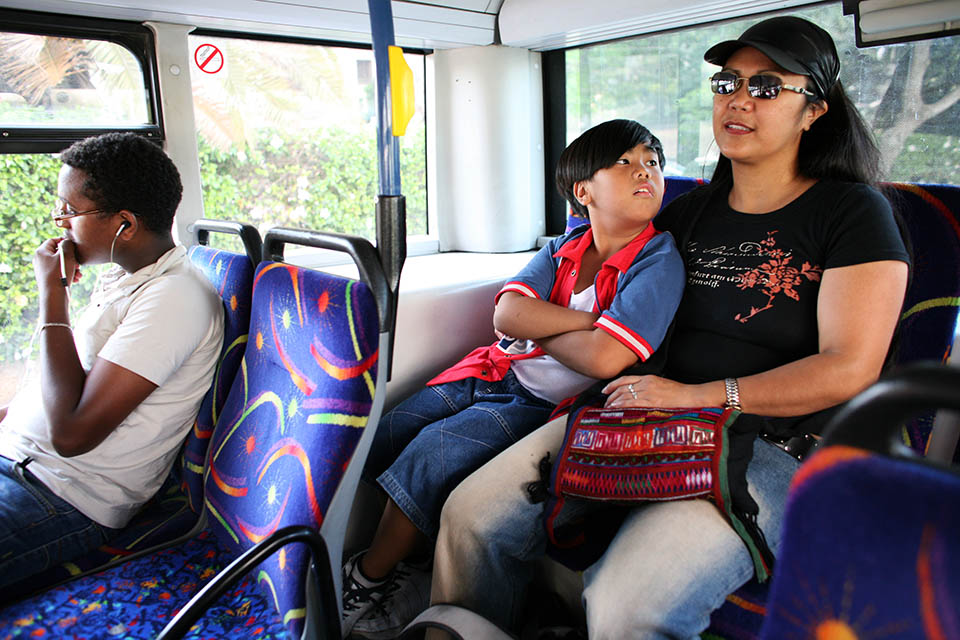 All contents © copyright Amos Roger. 2024 All rights reserved
All contents © copyright Amos Roger. 2024 All rights reservedIsraeli Passport
Marife Adriano, A Project About the Philippine Foreign Workers in Israel
The project documents the fascinating story of Marife Adriano, who has been living in Israel as an illegal foreign worker for the past 14 years. Only recently has she received the status of a temporary resident. This status has enabled her, for the first time in years, to return for a visit to the Philippines and meet those she left behind. I accompanied her during her first correspondences with the Ministry of Interior, all through receiving her residency status as well as her visit to her homeland. Through Marife's story we get a unique glimpse to the world of Philippine immigrant workers in Israel. Her intriguing personal story embodies compassion, warmth, courage and leadership.
This body of photography allows us to see the people who live around us every day, caring for our parents, cleaning our houses. To us, they are transparent, invisible even. This photography project invites you to discover a hidden world that lies within each and every one of us.
This phenomenon of labor migration is a universal phenomenon, part of the globalization process which characterizes the modern world. During the first Intifada in the 1990's, the State of Israel began importing foreign workers from third world countries in order to fill the void in the labor market. Filipinos were the first foreign workers to come to Israel, a migration which has lasted to this day, and as a result the Philippine community is one of the largest and oldest within the foreign worker community. There are about 50,000 Philippine foreign workers in Israel, mostly women who come to work in nursing. Many of them stay in Israel beyond their authorized visas and have children, thus becoming illegal aliens.
In 1995 Marife, mother to 3 year old Kevin, had been working in the Philippines as a manual laborer in a textile factory. From this type of job, her monthly salary amounted to 50 dollars. This salary could not enable her to make a respectable living. In order to allow a better life for her family, she went to work in Israel, leaving her son behind with her parents.
In her early days in Israel she found jobs through an agency located on Allenby St. in Tel-Aviv. After several years, Marife decided to leave the agency and rented an apartment in South Tel-Aviv. She earned her living by cleaning houses and stairways.
Seven years ago, Marife gave birth to a son named Adwin, from an affair she had with a Filipino man who had also been working in Israel. That man returned to the Philippines shortly after his son was born, and since then there has been no contact with him. As an infant, Adwin stayed at a foreign worker day-care near the New Central Bus Station in Tel-Aviv. He'd spend each day at the day-care until 7 pm – when Marife finished her work. At age 6 he began studying at Bialik-Rogozin School in Tel-Aviv. At the same time, in order to acclimatize in Israel, Marife began learning Hebrew in an Evening Ulpan at that same school. Despite the difficulty of raising a child in a foreign country, she always made sure to send a large part of her salary to her family in the Philippines.
In 2005 the State of Israel decided to approve a one-time gesture of granting 900 foreign worker children a status of permanent residency. The criteria for receiving this status required that each child be born in Israel and had been living in Israel for over 6 years. This way, thanks to Adwin, Marife was given a certificate and in July 2008 both she and Adwin left the Ministry of Interior with Identity Cards as well as a permanent residency license which must be renewed every year.
Thanks to this new status, Marife could finally visit her family. On December 2008 she flew with Adwin to the Philippines. There, she met for the first time in 14 years, her 17 year old son Kevin – who now studies Electrical Engineering at the University. These studies were made possible by the money his mother had sent all those years. In addition, the family house had been renovated and their standard of living had improved.
These days Marife lives with Adwin in Tel-Aviv. Her dream is to become an equal citizen in the State of Israel. This photography project took place over a year and a half: from December 2007 to May 2009.
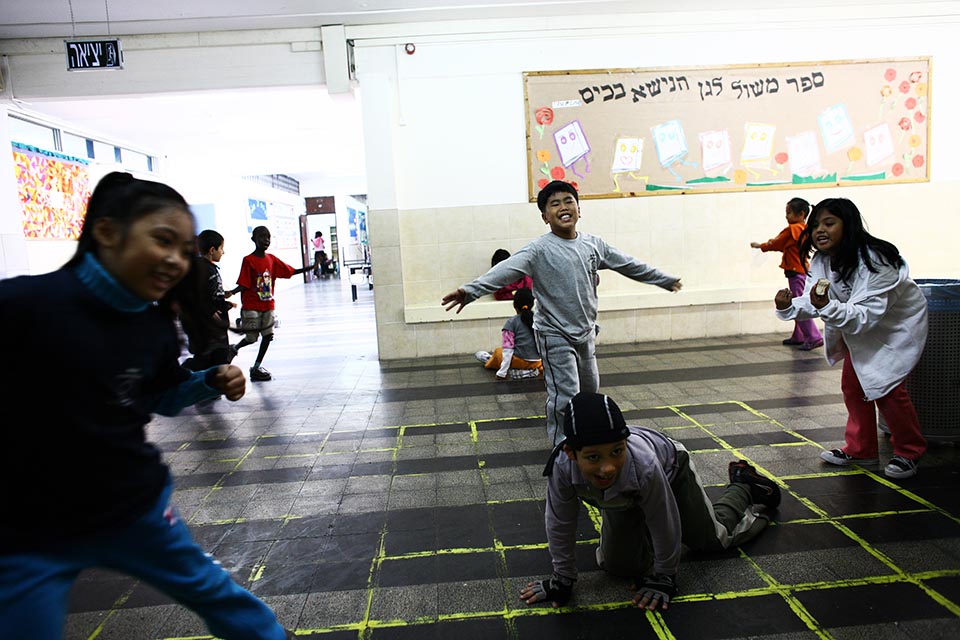 All contents © copyright Amos Roger. 2024 All rights reserved
All contents © copyright Amos Roger. 2024 All rights reserved





























